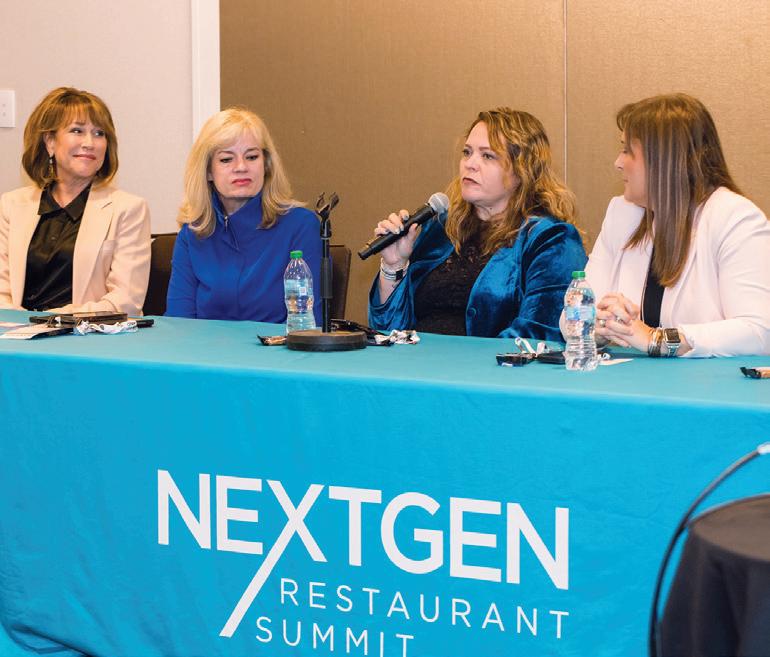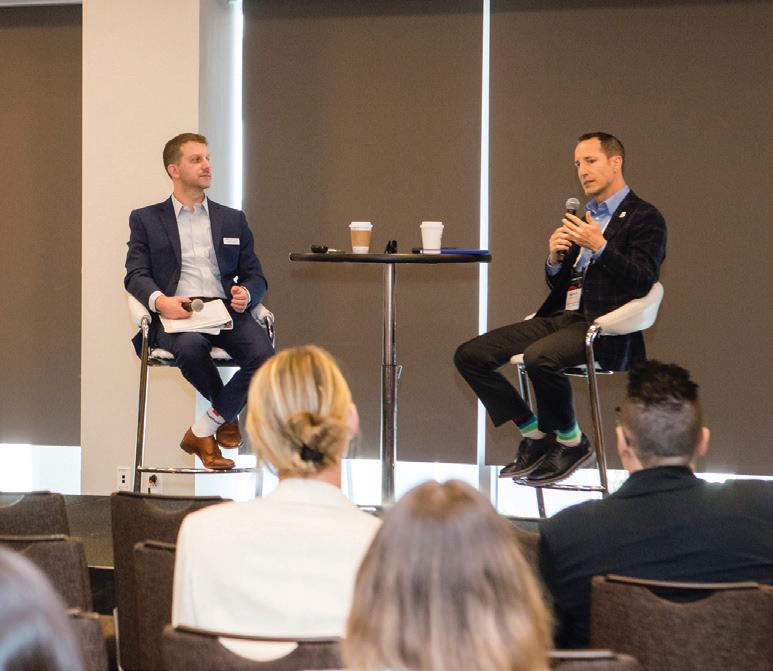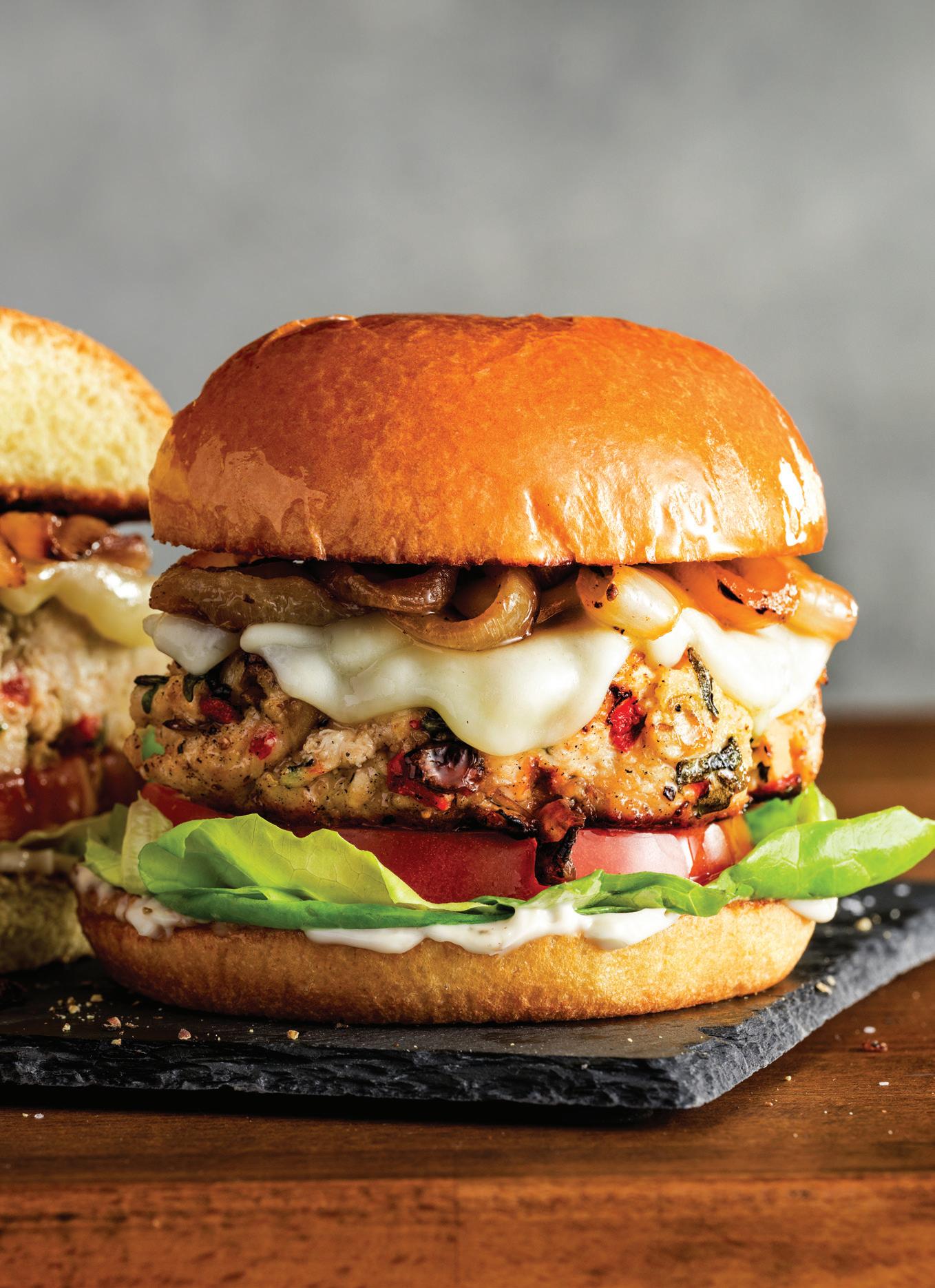OF
BARTENDER COMPETITIONS
SUSTAINABILITY ON THE PLATE


EMPOWERING NEXTGEN
THE POST CHICKEN & BEER

OF
BARTENDER COMPETITIONS
SUSTAINABILITY ON THE PLATE


EMPOWERING NEXTGEN
THE POST CHICKEN & BEER
MARKETING MAVEN NICHOLE ROBILLARD IS REVITALIZING LEGACY BRAND RED LOBSTER
MEET 11 VISIONARIES WHO ARE PUSHING THE NEEDLE FORWARD AND RESHAPING THE RESTAURANT INDUSTRY HOW CHEF ROSANA RIVERA
BEAT THE ODDS (AND BOBBY FLAY)



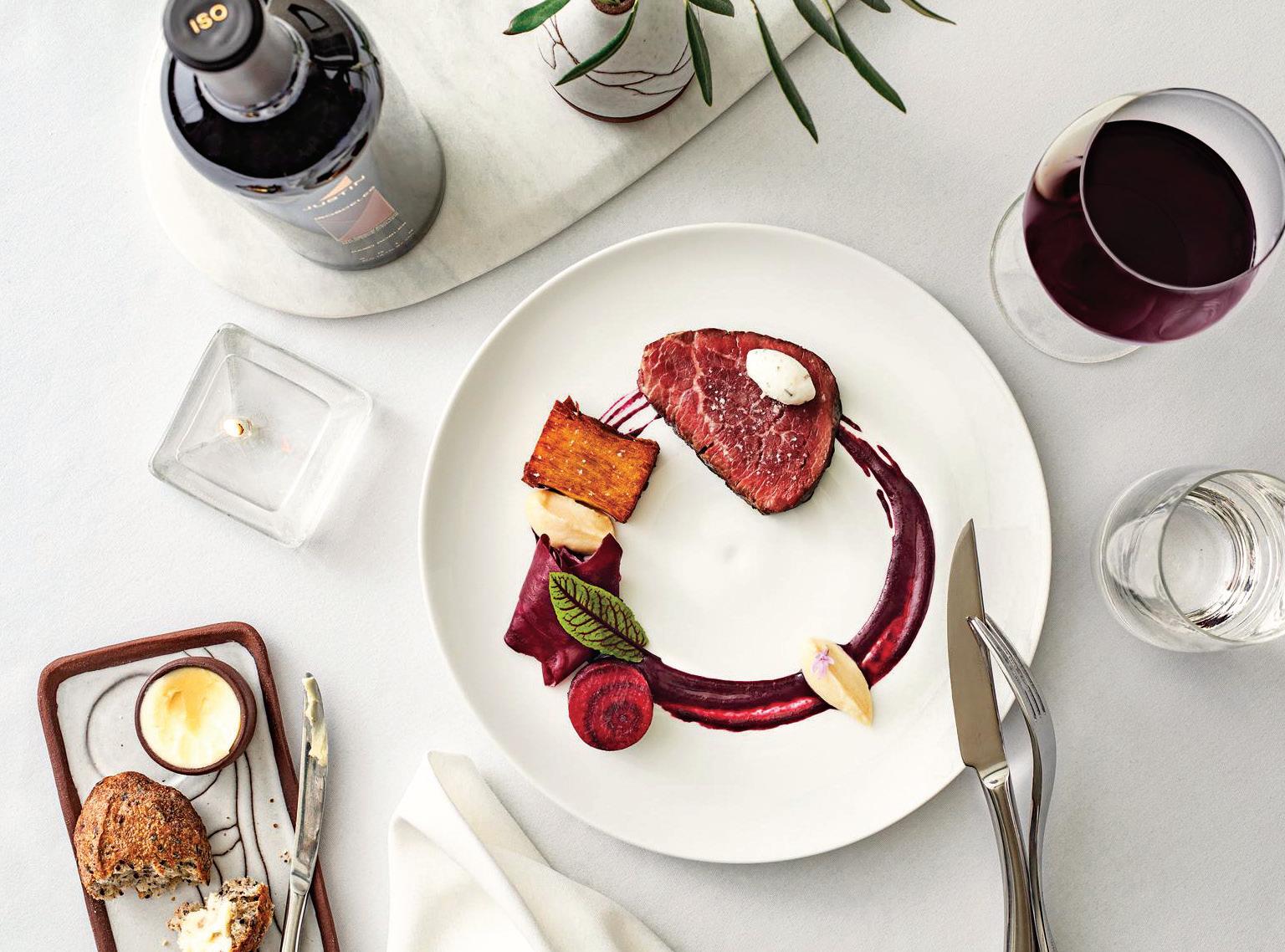
Meet 11 women in restaurant leadership who are breaking barriers and reshaping the dining industry, from marketing and operations to training and mentorship.
New CMO Nichole Robillard is winning back America’s hearts and putting the legacy chain at the forefront of consumers’ minds again.
CHEFS & INGREDIENTS
13 Beating the Odds and Bobby Flay
Chef Rosana Rivera’s story is one of heritage, hustle, and the perfect empanada that beat Bobby Flay.
Here are practical ways to reduce your restaurant’s environmental impact, from energy usage to tackling food waste.
Restaurant brands like Bar Louie and Flight Club are proving how bartender competitions can be a win-win for operators and staff members alike, shaking up menus with new ideas while boosting team morale.
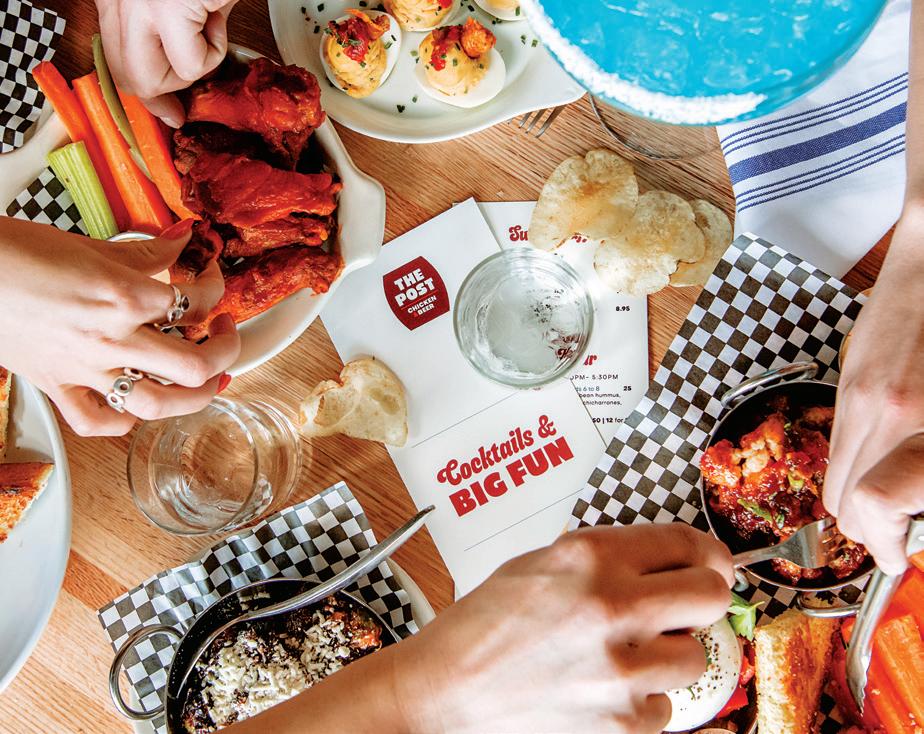
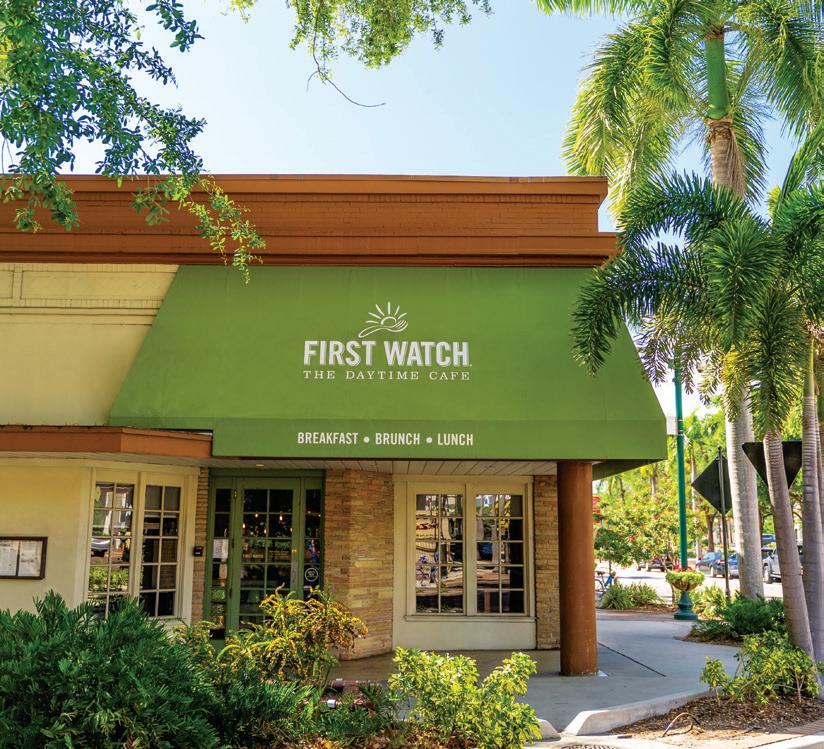
7 Unveiling FSR’s New NextGen Council
This progressive team is steering the future of elevated, guest-focused hospitality and helping to shape the trends and topics central to the evolving NextGen Casual segment.
8 Foot Traffic is Up, but Spending is Down
A recent report shows that despite an uptick in transactions at small restaurants, consumer spending continues to decline, thanks to inflation-induced pressures.
35 Where Comfort Meets Craft at The Post
ON THE RISE The awardwinning comfort food at Colorado-based The Post Chicken and Beer was born from a deep love for fried chicken and hospitality.
WOMEN IN LEADERSHIP
Melissa Fry, senior director of marketing for HOA Brands, is leading Hooters into the future through innovation and inclusivity, and revitalizing the iconic franchise for a new generation of leaders.
BEHIND THE SCENES Melissa Walsh, brand insights manager at First Watch, chats about spearheading the launch of a proprietary tracker to decode customer preferences and emerging trends, plus insights on overcoming data challenges and connecting more effectively with the brand’s 500-plus locations.
ALSO IN THIS ISSUE
4 Editor’s Welcome 39 Advertising Index
EDITORIAL
VP, EDITORIAL DIRECTOR: FOOD, RETAIL, & HOSPITALITY Danny Klein dklein@wtwhmedia.com
FSR EDITOR Callie Evergreen cevergreen@wtwhmedia.com
QSR EDITOR Ben Coley bcoley@wtwhmedia.com
ASSOCIATE EDITOR Sam Danley sdanley@wtwhmedia.com
ASSOCIATE EDITOR Satyne Doner sdoner@wtwhmedia.com
SVP, AUDIENCE GROWTH Greg Sanders gsanders@wtwhmedia.com
CONTENT STUDIO
VP, CONTENT STUDIO Peggy Carouthers pcarouthers@wtwhmedia.com
WRITER, CONTENT STUDIO Drew Filipski dfilipski@wtwhmedia.com
WRITER, CONTENT STUDIO Ya’el McLoud ymcloud@wtwhmedia.com
WRITER, CONTENT STUDIO Abby Winterburn awinterburn@wtwhmedia.com
DESIGN
ART DIRECTOR Erica Naftolowitz enaftolowitz@wtwhmedia.com

2024 REGIONAL GOLD AWARD: PUBLICATION DESIGN
2023 NATIONAL GOLD AWARDS: FRONT COVER (PHOTO), BEST USE OF COLOR NATIONAL SILVER AWARD: BEST USE OF TYPOGRAPHY
2016 MAGAZINE OF THE YEAR TOP 10 AWARD
2015 MAGAZINE OF THE YEAR
FOLIO: Eddie Awards
2022 BEST FULL ISSUE HOSPITALITY
2022 BEST SPONSORED CONTENT
2021 BEST PROFILE FEATURE
2017 BEST FULL ISSUE FOOD & BEVERAGE
2013 BEST DESIGN, NEW MAGAZINE
2013 BEST FULL ISSUE, FOOD SERVICE/HOTEL
® SALES & BUSINESS DEVELOPMENT
VP SALES: FOOD, RETAIL, & HOSPITALITY
Lindsay Buck lbuck@wtwhmedia.com
VP, BUSINESS DEVELOPMENT
Eugene Drezner 919-945-0705 edrezner@wtwhmedia.com
NATIONAL SALES DIRECTOR Amber Dobsovic 757-637-8673 adobsovic@wtwhmedia.com
NATIONAL SALES DIRECTOR Edward Richards 216-956-6636 erichards@wtwhmedia.com
NATIONAL SALES MANAGER Mike Weinreich 561-398-2686 mweinreich@wtwhmedia.com
NATIONAL SALES MANAGER Tom Boyles 662-607-5249 tboyles@wtwhmedia.com
CUSTOMER SERVICE REPRESENTATIVE Tracy Doubts 919-945-0704 tdoubts@wtwhmedia.com
ADMINISTRATION
CEO Matt Logan mlogan@wtwhmedia.com 919-945-0704 www.fsrmagazine.com/subscribe
FSR is provided without charge upon request to individuals residing in the U.S. who meet subscription criteria as set forth by the publisher.
REPRINTS
THE YGS GROUP 800-290-5460 fax: 717-825-2150 fsrmagazine@theygsgroup.com
Sponsored content in this magazine is provided to the represented company for a fee. Such content is written to be informational and nonpromotional. Comments welcomed at sponsoredcontent@ fsrmagazine.com.
FOUNDER
Webb C. Howell
LinkedIn.com/company/ FSR-magazine
Instagram.com/FSRmagazine Facebook.com/FSRmag Twitter.com/FSRmag
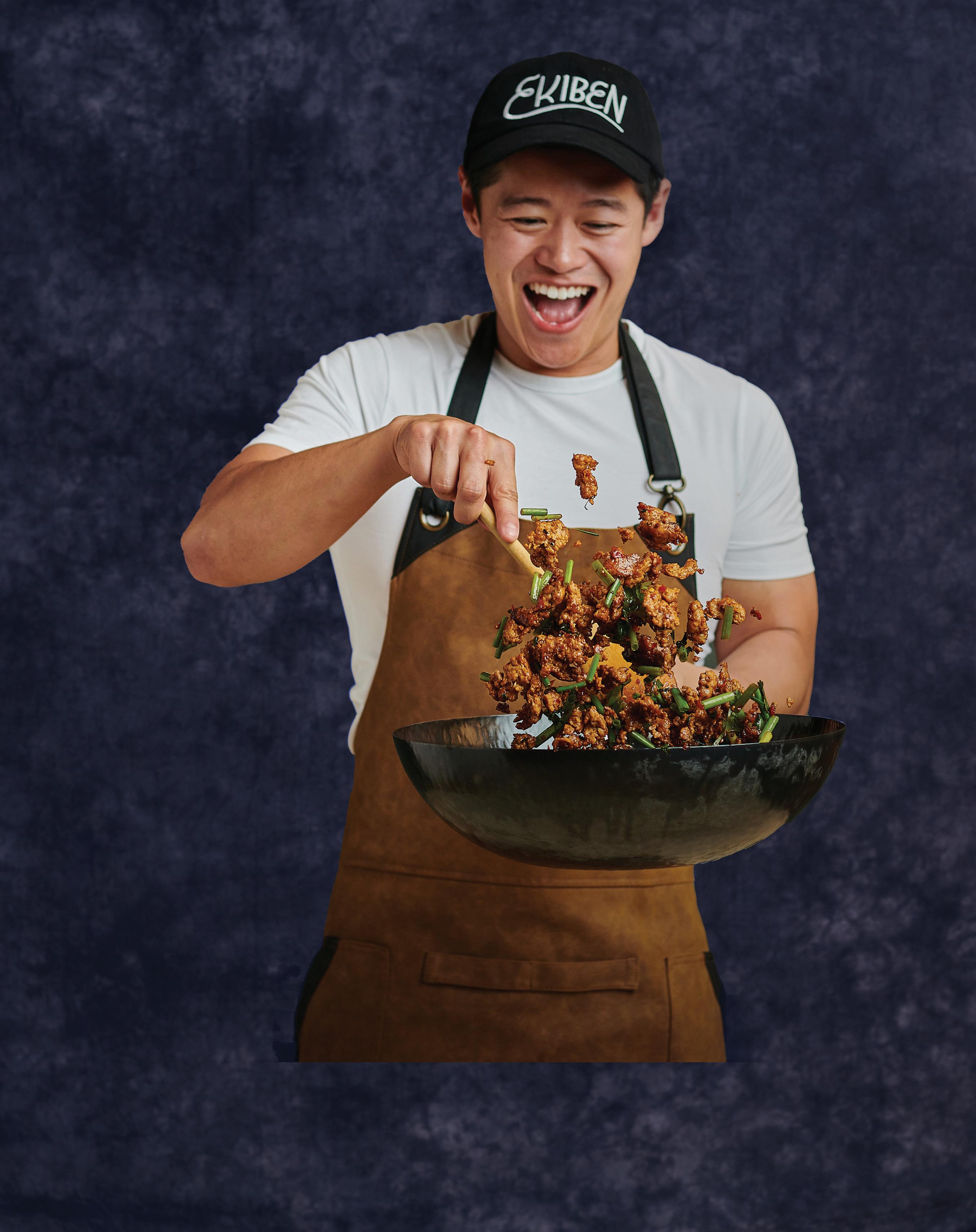


Co-Owner and Chef, Ekiben
McCormick Culinary can help save you time on the line, delivering consistent, vibrant flavors for your dishes. With 130+ years of expertise, our variety of blends, herbs, spices, and seasonings are crafted without compromise to offer quality you can trust in your back of house.


I HAD THE PRIVILEGE of sharing a part of my personal story on stage at the Women in Restaurant Leadership (w i rl) Together Summit in February. When I asked the crowd to raise their hands if they had ever been in a situation where they were afraid to speak their minds, every hand in the room quickly shot up—including my own. I had a lot of fear growing up of being called stupid or wrong, so I censored myself and didn’t share my thoughts or opinions, instead choosing to play into the “ditzy dumb blonde” stereotype. It took practicing using my voice to start building up my confidence, which still shakes at times. But the more I speak up, the more empowered I feel, and the more I can embody my values and speak my mind, even if I think someone might disagree with me.
What I love so much about the community being built at WiRL is the authentic support and encouragement freely given to each other, and the space to be vulnerable and ask questions without judgment. Our cover story this month (PAGE 22) features 11 women in leadership who are pushing the needle forward in the full-service restaurant industry. One of my favorite quotes is from Rachel Richal, VP of Restaurant Experience and Training at Buffalo Wild Wings, who says: “Imagine if everyone was invested in identifying and supporting the next woman in leadership. Simply starting a conversation and encouraging women to take on challenges helps them build trust in themselves and advance in their careers.”
From empowering future Hooters Girls on PAGE 37 to the female chef who made the perfect empanada that beat Bobby Flay on PAGE 13, this issue is packed full of inspiring stories that highlight the women who are crushing it in this male-dominated industry. Mindy Armstrong, VP of Menu Innovation at Perkins American Food Co., says it best: “Let’s not forget the power of representation. We need to see more trailblazers and trendsetters who inspire future female leaders.”
As you dig into these stories, also make sure to mark your 2026 calendar for February 25-26—WiRL is coming to Charleston, South Carolina! #WiRLPower

Callie Evergreen EDITOR

cevergreen@wtwhmedia.com FSRmag @FSRmagazine

On the Cover
Photographed by Angelika Krug Shannon, this month’s cover star is Nichole Robillard, who leads the pack of the Women in Restaurant Leadership feature. The new CMO of Red Lobster reflects on her career journey from waiting tables at a country club to serving as the CMO of Smokey Bones before joining Red Lobster. Now, her mission is to bring the 56-year-old legacy chain back to the forefront and make the brand compelling, relevant, and exciting again.
To learn more about Angelika, visit her website at angelikakrugphotofilm.com.



STIR FRIED MUSTARD YUKON POTATOES
Chef Vittal Shetty
Jalsa Catering & Events






From experiential dining to elevated menus with seasonal ingredients, the leaders in the NextGen Council are paving the way for casual dining.
BY CALLIE EVERGREEN
This progressive team of leaders is steering the future of elevated, guestfocused hospitality.
IN NOVEMBER 2021, FSR introduced “NextGen Casual,” an emerging segment of restaurant concepts that blend the elevated experience of full-service dining with the convenience of fast casual and a renewed focus on technology and company culture.
The progressive nature of the NextGen Casual segment means there are always new ideas to learn and share, whether it’s about best practices in off-premises operations or creating a culture with upward mobility for team members—which is why FSR formed the NextGen Council, a team
of top industry leaders who help shape the trends and topics central to the evolving segment.
FSR is excited to introduce the third class of its NextGen Council:
Josh Kern
CEO, SPB Hospitality SPB Hospitality is the franchisor of full-service dining restaurants spanning a national footprint of hundreds of restaurants and breweries, including iconic brands such as Logan’s Roadhouse, J Alexander’s, Stoney River, Old Chicago Pizza & Taproom, and Krystal Restaurants.
Toni Ronayne
President, Perkins American Food Co. (Ascent Hospitality Management) Perkins American Food Co. (formerly Perkins Restaurant and Bakery) is a 65-year-old family dining concept with just under 300 restaurants in the U.S. and Canada. Perkins is currently undergoing a big brand refresh inclusive of an updated brand, menu, and two new restaurant concepts.
Rachel Richal
VP of Restaurant Experience & Training, Buffalo Wild Wings (Inspire Brands) Buffalo Wild Wings is the largest sports bar brand in the U.S., with more than 1,300 restaurants in eight global markets. Additionally, Buffalo Wild Wings GO, a growing takeoutand delivery-focused format, has almost 150 locations.
Jonathan Weathington
CEO, Shuckin’ Shack Oyster Bar Shuckin’ Shack is “a fresh seafood, cold beer, and good vibes concept” based out of Wilmington, North Carolina, with locations in five other states including South Carolina, Georgia, Maryland, Florida, and Illinois.
Elizabeth Brasch
EVP of Marketing, Mellow Mushroom
Mellow Mushroom is a casual-dining franchised pizza restaurant concept based in Atlanta with more than 160 locations. For the last 50 years, the brand has served up delicious stone-baked pizzas, coupled with a variety of menu offerings and full bar, and just recently opened its first ever fast-fine concept iteration.
Marita Swift
VP of Strategic Growth, The Big Biscuit Founded in 2000, The Big Biscuit is a classic American breakfast and lunch concept headquartered in Kansas City, Missouri, with nearly 30 restaurants across Kansas, Missouri, Oklahoma, and Arkansas.
Juan Sebastian Ovalle
VP of Business Analytics, Firebirds
Wood Fired Grill Based in Charlotte, North Carolina, Firebirds is a polished casual-dining concept specializing in wood-fired steaks, seafood, craft cocktails, and more. Founded in 2000, Firebirds has grown to 64 locations across 20 states.

Jack Gibbons
CEO, FB Society FB Society is a Texasbased group of experience-driven, innovative restaurants including Whiskey Cake, Sixty Vines, Haywire, Ida Claire, Son of a Butcher Slider Bar, The Ranch, and Mexican Sugar.
Melissa Walsh
Brand Insights Manager, First Watch
With over 500 restaurants, First Watch is the leading daytime dining concept that continues to serve up made-to-order breakfast, brunch, and lunch using fresh ingredients alongside a chef-driven menu rotating five times a year.
Bonnie Iavaroni
COO, Turning Point Restaurants Turning Point Restaurants has grown from a single coffee and tea shop to a rapidly expanding chain that recently surpassed the 30-location milestone and is on pace to reach about 40 locations by the end of 2025.
Mindy Armstrong
VP of Menu Innovation, Ascent Hospitality Management Ascent Hospitality Management is an Atlantabased group of family dining brands, including Huddle House and Perkins with more than 500 units across the U.S. and Canada.
Liz Moskow
NextGen Council Co-Moderator, Food Futurist, Founder of saase
Consumer spending at restaurants continues to decline despite an uptick in transactions, which reflects inflation-induced pressures, according to the February 2025 Small Business Index published by Fiserv. Key findings include:
» Consumer spending at small business restaurants declined (-2.4%) year-over-year
» Transactions (or foot traffic) grew (+5.9%) year-over-year
» Negative growth was the result of lower average ticket sizes (-1.6%) month-over-month
» Month-over-month restaurant sales increased (+2.3%), and transactions increased (+3.9%)




















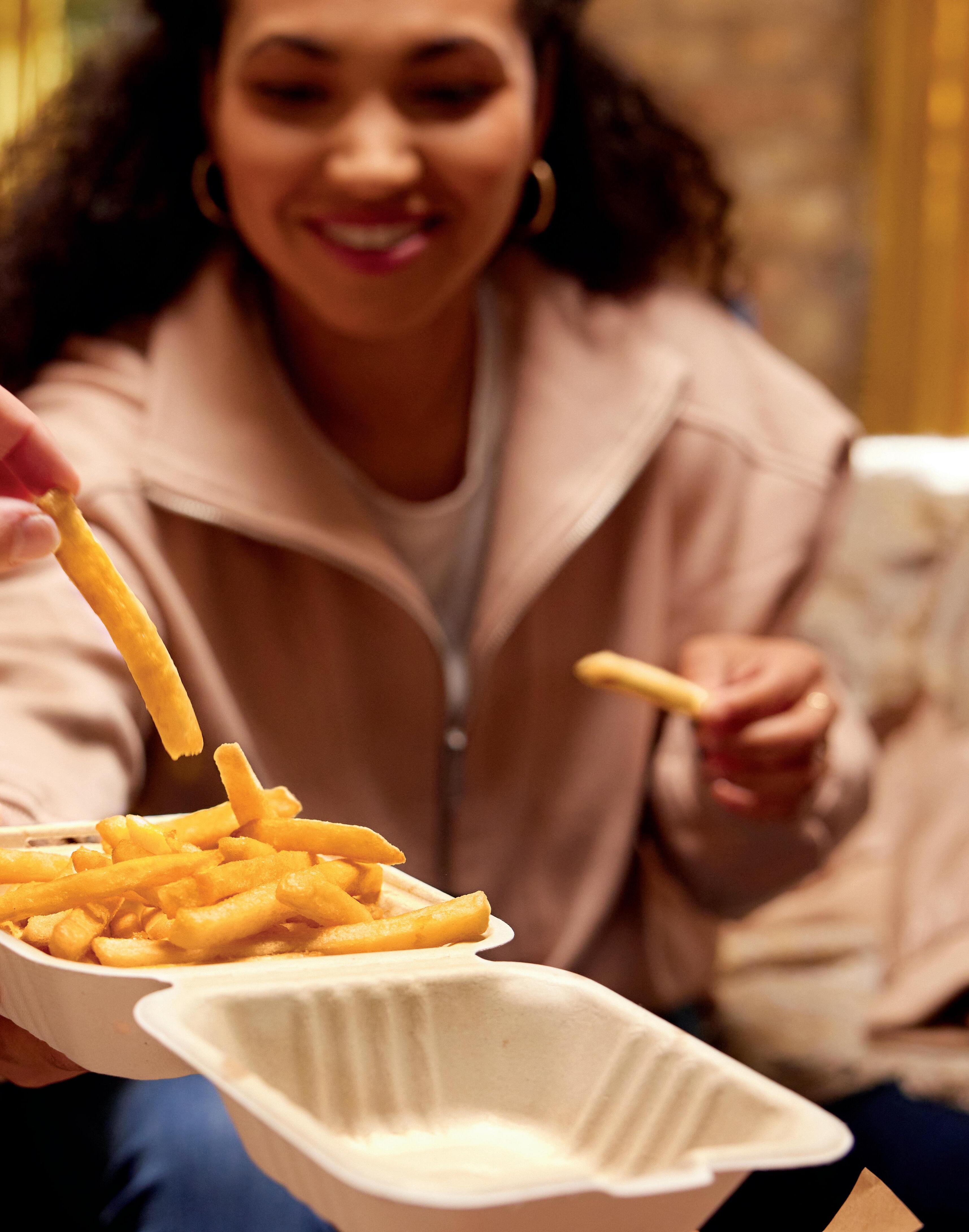




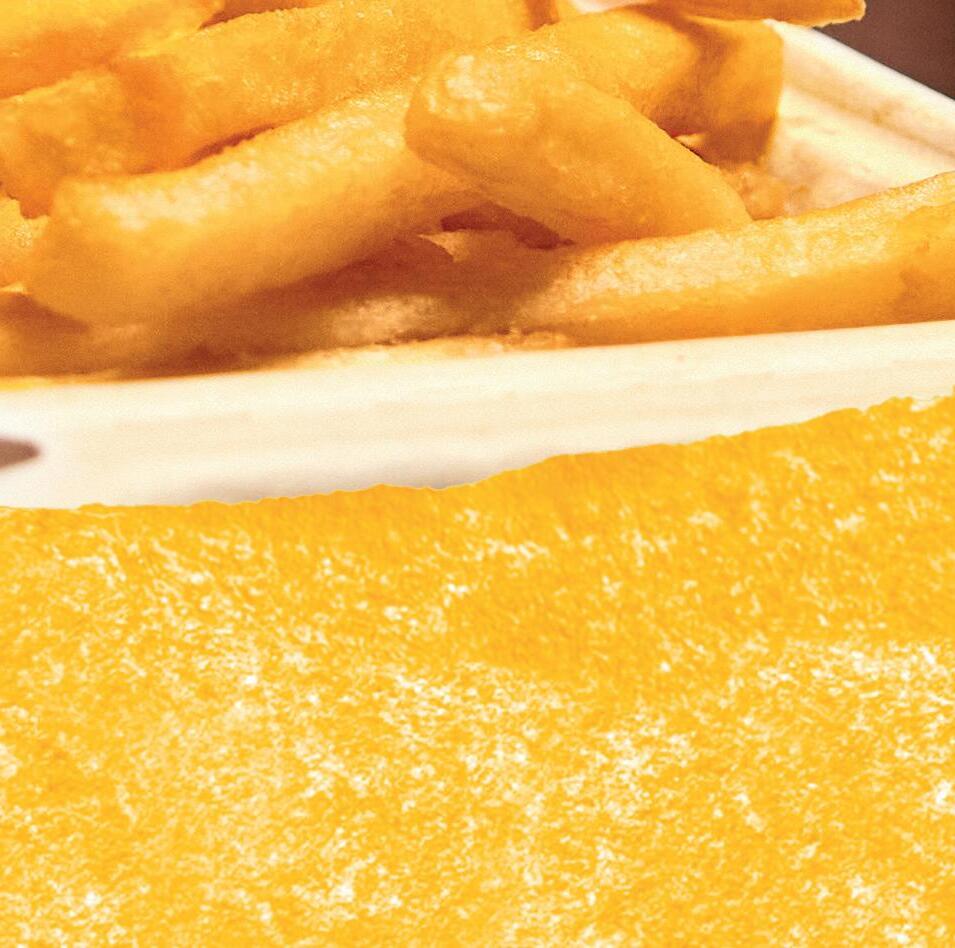





















MENTIONED IN THIS SECTION CHEF & THE BAKER • • CARUSO’S • • JUSTIN VINEYARDS & WINERY • • SAN YSIDRO RANCH

BY SATYNE DONER
Chef Rosana Rivera’s story is one of heritage, hustle, and the perfect empanada.
CHEF ROSANA RIVERA hails from the lush Puerto Rican countryside, born into a lineage of three generations of maternal cooks. Her mother and grandmother were the perfect hostesses, preparing brunch and paella every Sunday for the community. She fondly remembers growing up in that environment, where food and entertainment left a lasting impression on her from an early age.
However, in the 1980s, the mainstream idea of becoming a professional chef was largely nonexistent, predating the rise of the Food Network and its roster of celebrity chefs in 1993. While culinary prowess was ingrained in the maternal Rivera bloodline, it was more of an expectation versus an actual career aspiration.
After attending business school in Puerto Rico, Rivera left the island for New York City to work in retail, specializing in luxury jewelry. As a naturally shy person, she says, this role allowed her to step outside her comfort zone and learn the ropes of hospitality by taking care of customers’ needs. The love of food never left her spirit; any time there was an event, she catered it herself.
But there came a time in her late 20s when she started to feel unfulfilled and disconnected from her true purpose as she traveled between Miami and New York for work. She realized she was at a crossroads in her career. Rivera called her sister late one night from her apartment, crying.
“This was a six-month conversation I had been having with myself, but I felt as though I was in the wrong career and wrong industry at the wrong time,” Rivera says. “My mom and my sister pushed me to reconnect with what I originally wanted to do. I began this era of really figuring out who I was and how to feel confident as a cook since I already missed out on years of experience professionally.”
Rivera embarked on a journey to get back to her roots, ignite her entrepreneurial spirit, and fully embrace herself as a chef. In 2006, she fell in love with the city of Tampa, Florida, and earned both an MBA in business sustainability and an associate degree in culinary arts. She began to build her business and make a name for herself in sunny Tampa Bay.
“I was pouring my blood, sweat, tears, and money into a new career. Going to culinary school wasn’t about formalities. It was just to feel more confident in my cooking abilities, and I did it for myself because I’m an overachiever,” Rivera says. “From that moment 20 years ago, I’ve never stopped.”
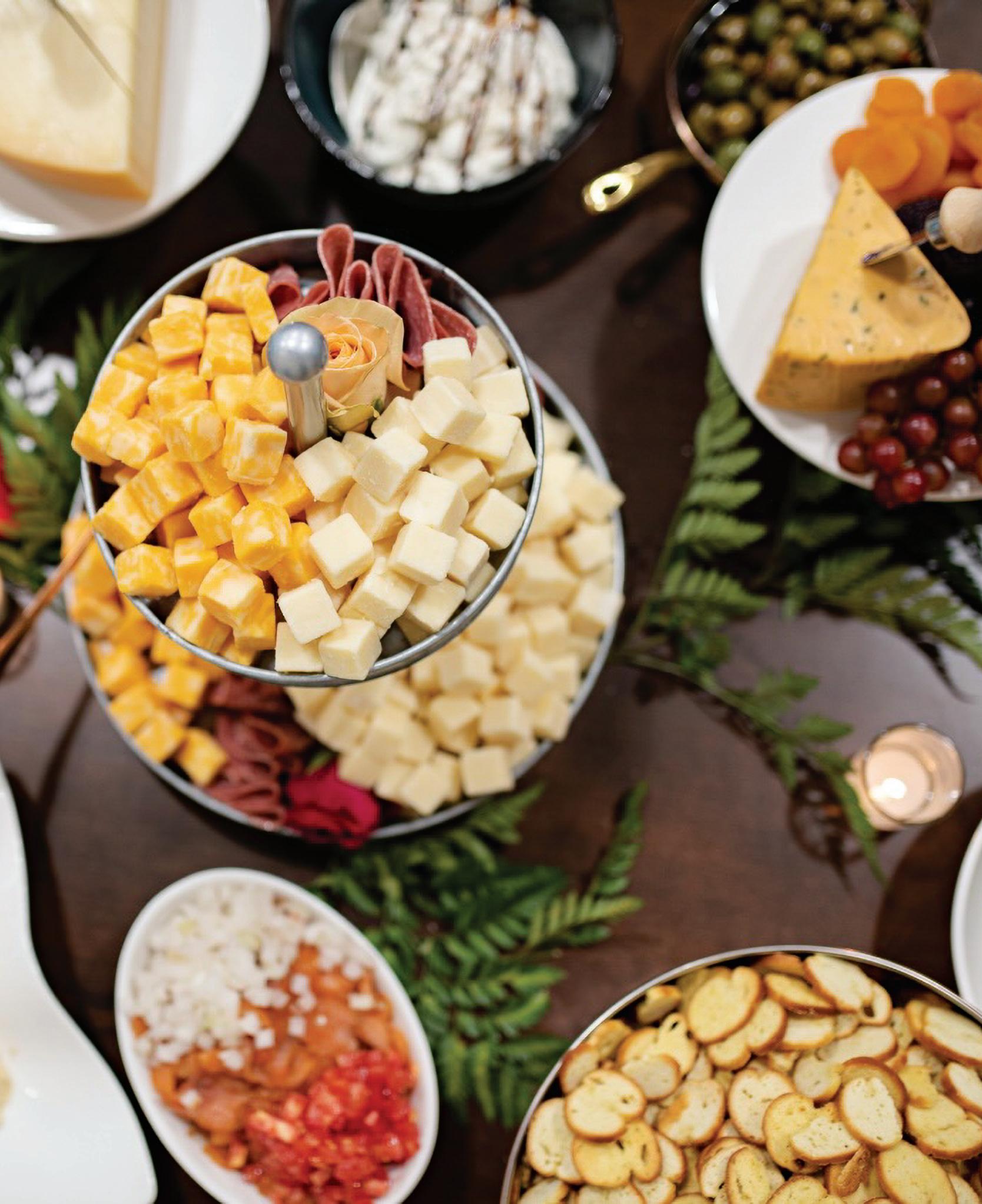
Tampa acted as an incubator for Rivera’s culinary vision. Where New York felt intimidating and cutthroat, Tampa was warm and welcoming. Her Hispanic background meshed well with the culture of the city, allowing her to put down roots.
Over the years, Rivera’s culinary vision inspired some of the city’s most beloved concepts, including Piquant bakery, Xilo Street Mexican ghost kitchen, Kofe, and most recently, Chef & the Baker. She also launched a robust catering and wholesale business, supplying pastries and other baked goods to local eateries and Tampa International Airport.
Perhaps the most serendipitous moment in her career was competing in Food Network’s “ Beat Bobby Flay ” in 2019, advancing with her husband, Ricardo Castro, and defeating Flay with
OVER THE YEARS, RIVERA’S CULINARY VISION INSPIRED SOME OF TAMPA’S MOST BELOVED CONCEPTS, INCLUDING PIQUANT BAKERY, XILO STREET MEXICAN, AND KOFE. NOW, SHE FOCUSES MAINLY ON HER WHOLESALE AND CATERING BUSINESS AS WELL AS HER NEWLY REOPENED FRENCHFUSION CAFÉ, CHEF & THE BAKER, WHICH HAS TWO LOCATIONS.

FAVORITE INGREDIENT RIGHT NOW: Red peppers
FAVORITE MUSIC TO COOK TO: Classical
FAVORITE FOODIE
DESTINATION: New York City
IF YOU COULD COOK FOR ONE PERSON, WHO WOULD IT BE: Martha Stewart

her signature beef empanadas—a recipe passed down in her family, now featured in a Bobby Flay cookbook. The empanadas feature fried Argentinian dough, slow cooked ground beef, braised with capers, olives, potatoes, tomatoes, and aromatics and seasonings. Castro came up with the idea to stamp the top of the empanadas with food-grade ink because they ran out of paper labels.

“[The empanadas] are my version of my mom’s version, and it was important to showcase that I am a Puerto Rican woman and this is my heritage,” Rivera adds. “We had just pivoted from having a humongous restaurant and bakery to operating three street food operations inside of a food hall when I got an email from Bobby’s casting agent. Again, I’m more shy, so I let the email sit for a few weeks before Ricardo and I decided to do it.”
But life is a delicate balance of ebbs and flows. While juggling her restaurants and the nerves that come with appearing on national television, Rivera was also her mother’s caregiver. She had to make the difficult decision to leave her mother while filming. This experience has given her a unique perspective on leadership and supporting her employees.
“Women have so much on their shoulders. We put ourselves through the grinder, and you just find a way to make it work. When my mother was having a flare-up, or I was having a bad day, Ricardo and my team had my back,” Rivera says. “I’ve had a lot of young mothers on my staff or women closer to my age who are dealing with being a caregiver. It’s life. But being empathetic and understanding has allowed me to create a resilient support system within my restaurants.”
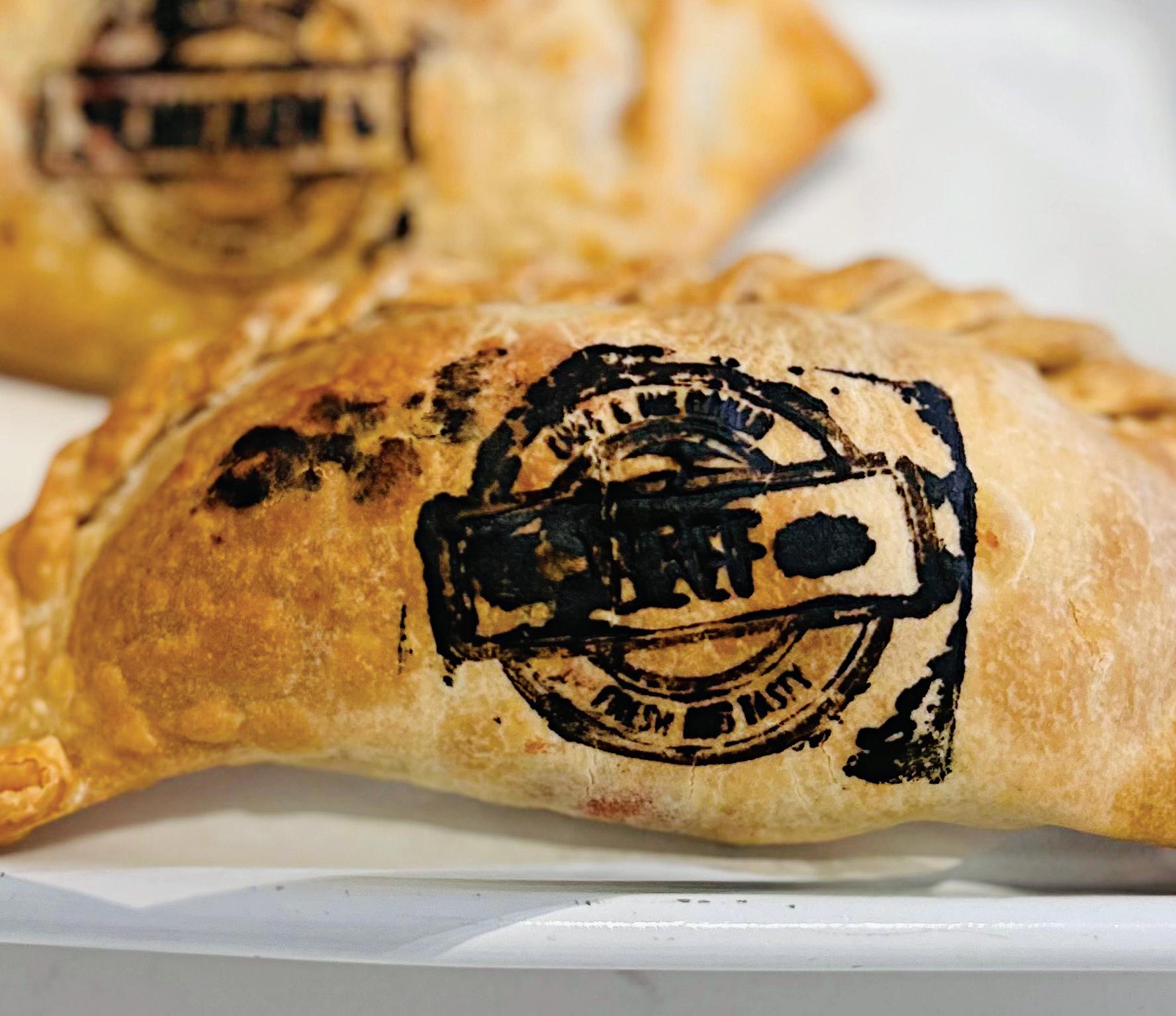
industry is, but I’m deliberate in what trends I partake in. I have to feel like it merits our customers to taste it—for example, guava or Korean flavors are on the rise right now, and as a Puerto Rican woman, I’ve been making guavainfused items for years, which is very validating,” Rivera explains. “I know what works in my café … but I will use my catering business as a playground for testing new items.”
Today, Rivera focuses mainly on her wholesale and catering business as well as her newly reopened French-fusion café, Chef & the Baker, which has two locations. The downtown Tampa café originally opened in October 2023, featuring a bakery and a retail section, but was unfortunately decimated after three weeks of operation by the disastrous Hurricane Milton. Once again, her community rallied behind her.
“So many people offered to help us. We owed it to our staff and neighborhood to figure out a way to keep pushing because this is what we love to do. We pulled up floors, we replaced equipment, we remodeled everything,” Rivera says.
Over the years, Rivera’s culinary philosophy has evolved into what she knows will be successful for her. She acknowledges that today’s young chefs are focused on chasing trends and experimenting with new ideas, but at this stage in her life, she thinks differently. She understands what works well for her business while making her own version of what she finds new and exciting. She is intentional about her menu offerings.
“I still want to know what the pulse of the
After almost three months of cleanup, Tampa’s Chef & the Baker reopened in January, serving up fresh pastries, chefdriven sandwiches, coffee, home and kitchen supplies, and of course … the signature beef empanadas that beat Bobby Flay. The community rallied around the business, commemorating its reopening with balloons and a huge celebration.
Looking back on her career and thinking about her future, Rivera now understands that happiness takes time to catch up. It means playing the long game. It takes sacrifice, resilience, and not being afraid to ask for help.
“Women are often put in a position where we don’t stay true to ourselves. People are going to deny you, they’re going to put barriers in your path. Don’t settle, be a good person, and don’t take no for an answer,” Rivera says. “I never let someone else’s ‘no’ stop me. Sometimes, it feels good to hear someone tell you that you can do it. So I’m telling the young chefs out there … you can do it, and I’m here to support you because I did it.”
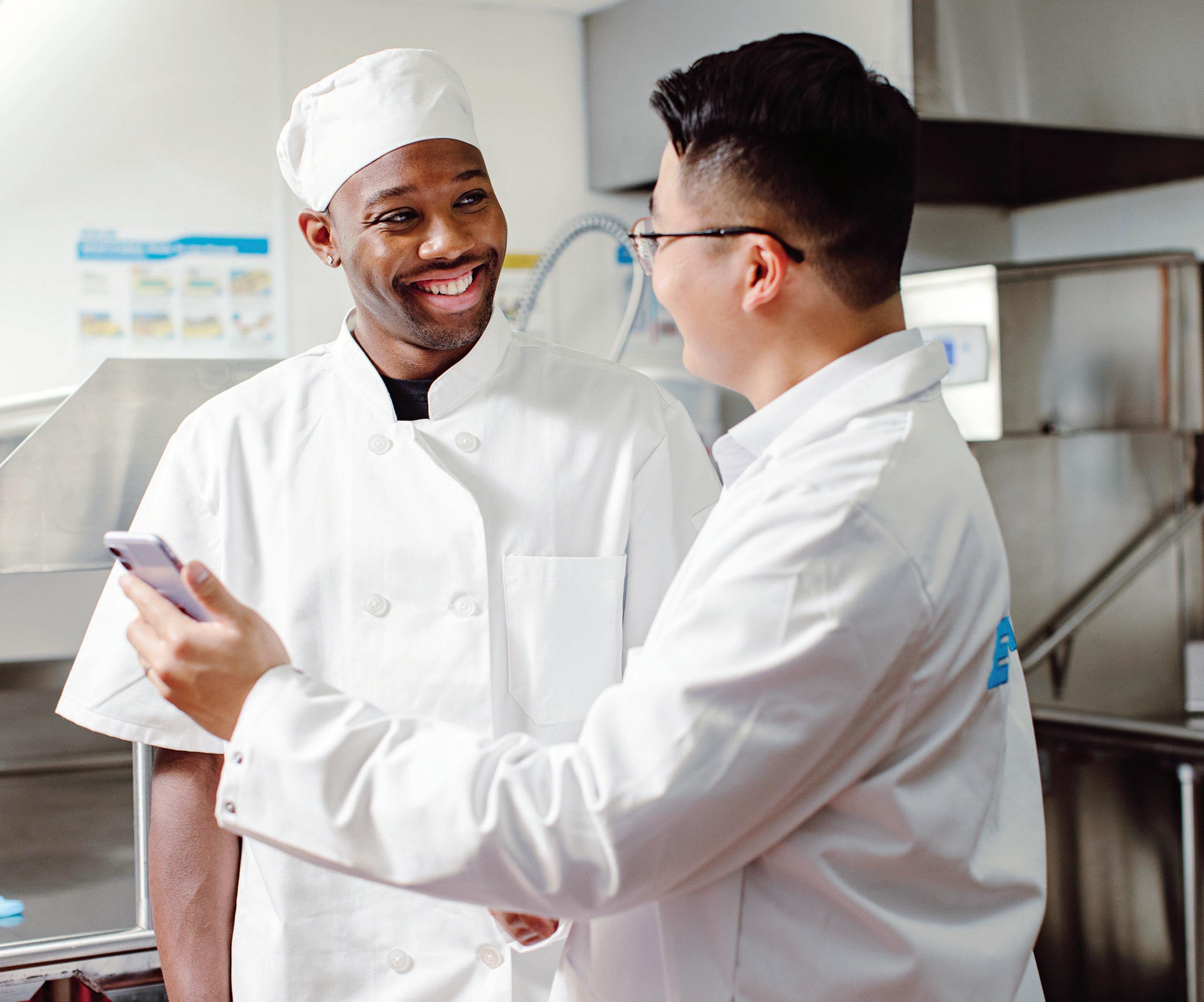
Discover how labor and time savings go hand in hand with positive customer experiences.
CLEANING IS GENERALLY NOT THOUGHT OF AS A KEY PART OF operational efficiency or labor savings. Still, in 2025 it is vital to look at every aspect of business to remain profitable. When 98 percent of operators report labor costs being a moderate or significant challenge—according to the National Restaurant Association—it is necessary to begin thinking outside of the box. Ecolab has seen operators struggle with labor and in response has curated a science-backed line
of nine products that combined can save up to *four hours of labor per day.* That can all add up to major savings especially when considering cleanliness can just as easily win customers over as drive them away.
Three in four customers would not patronize a business with negative reviews about cleanliness, according to Modern Restaurant Management. Consistency is key, considering even one poor cleanliness experience can lead to exponential missed revenue and traffic. “Cleaning is often seen as a time-consuming task where operators want to cut corners,” says Katie Molinaro, director of research and development at Ecolab’s Institutional Foodservice sector. “We work to simplify processes, making them as efficient and effortless as possible."
Ecolab is big in busting myths as well, making a time-consuming, and often complicated task in the restaurant more effective and easier. "Ecolab goes beyond just providing cleaning products—we offer service and expertise,” Molinaro says. “If you have a dish machine, we make sure it’s running perfectly and that your chemistry is optimized for effectiveness and efficiency."
Another barrier to cleaning is that many companies use harsh chemicals to create effective formulations. The
irritation of harsh chemicals on skin, eyes, and noses can be a barrier to completing cleaning tasks for employees and is an unpleasant olfactory experience for customers who would rather smell their food than bleach. "A big misconception is that cleaning products have to be harsh to be effective,” Molinaro says. “Many assume bleach or high-pH products are the only solutions, but we’ve developed alternatives that are just as powerful and much safer."
Operators and everyday employees are often not trained to be experts in cleanliness and the science behind how and why certain products are effective.
"Many cleaning mistakes happen out of habit—using the wrong tools, applying too much product, or not allowing enough contact time for sanitizers to work,” Molinaro says. Partnering with a company like Ecolab ensures fewer of these mistakes happen through proper training and the display of information on products.
Proper training also leads to less waste which many operators only consider for food items, however, waste can come from multiple sources and
operators can save money by using cleaning items in the most scientifically sound way possible. "One major mistake we see is operators using too much cleaning product, thinking more is better,” Molinaro says. “Proper dispensing systems ensure they use just the right amount, reducing waste and cost."
Taking a multi-pronged approach to saving money in 2025 is key to remaining competitive as costs continue to rise. "Our approach to labor savings is scientific,” Molinaro says. “We compare our product performance against industry benchmarks, test in labs, then validate in real kitchens to ensure our claims hold up in real-world conditions." Ecolab’s commitment to working with operators in their kitchens, dining rooms, and storage areas is revealed in their product's efficacy.
"One of our latest innovations is the Ecolab ELT low-temp dish machine,” Molinaro says. “It cuts wash cycles from 90 seconds to 67 seconds, which might not seem like much, but when you're washing 220 racks a day, those savings add up fast." Operators know firsthand that saving just a few seconds can significantly reduce labor,
“Ecolab goes beyond just providing cleaning products—we offer service and expertise”

time, and costs. However, the real challenge lies in finding proven solutions that truly deliver results.
"We tailor cleaning solutions to each business,” Molinaro says. “A small deli with mostly ready-to-eat items doesn’t need the same products as a steakhouse. We optimize for their specific needs, water conditions, and operational requirements."
Some companies are simply trying to sell products, however, Ecolab’s team prides itself on being invested in the success of restaurants it supplies and will work to find personalized solutions that work for every operator's unique operational needs.
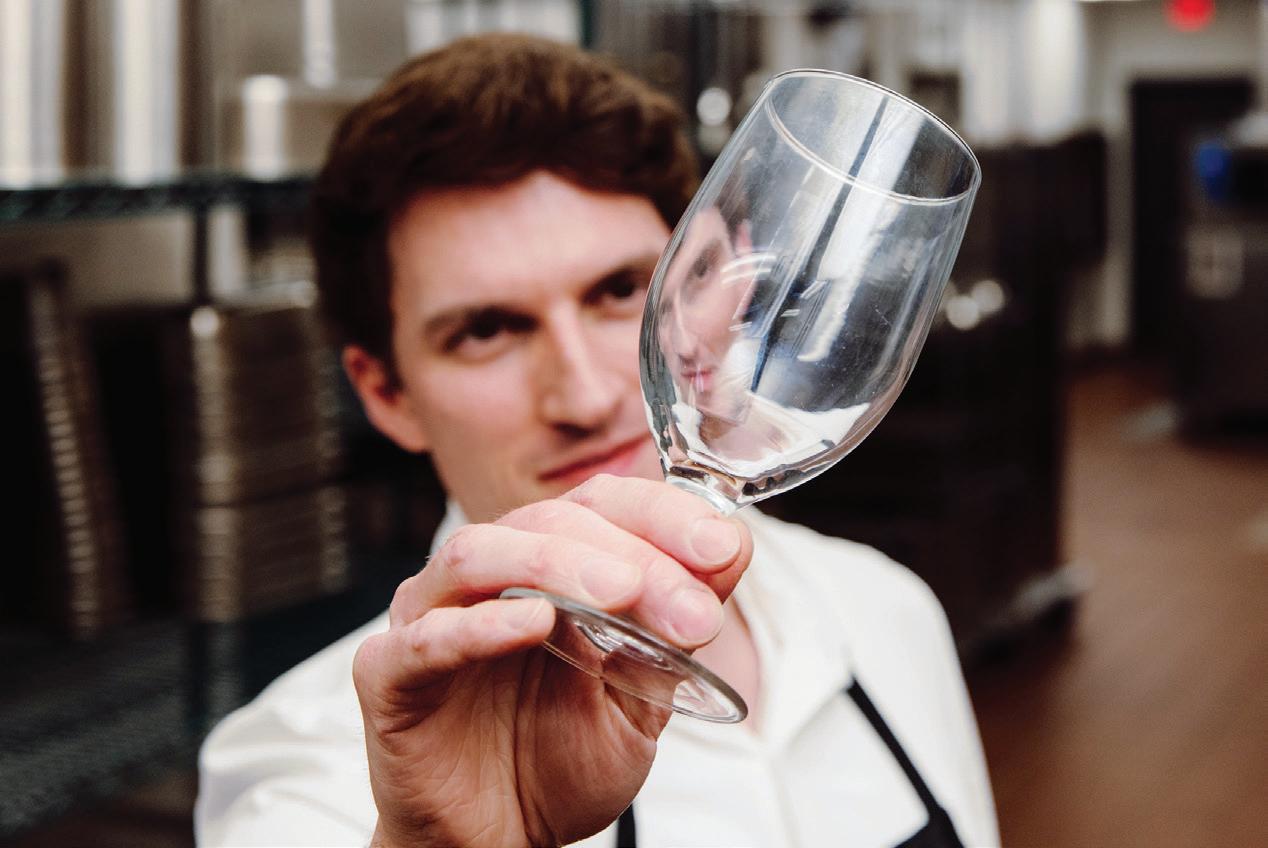
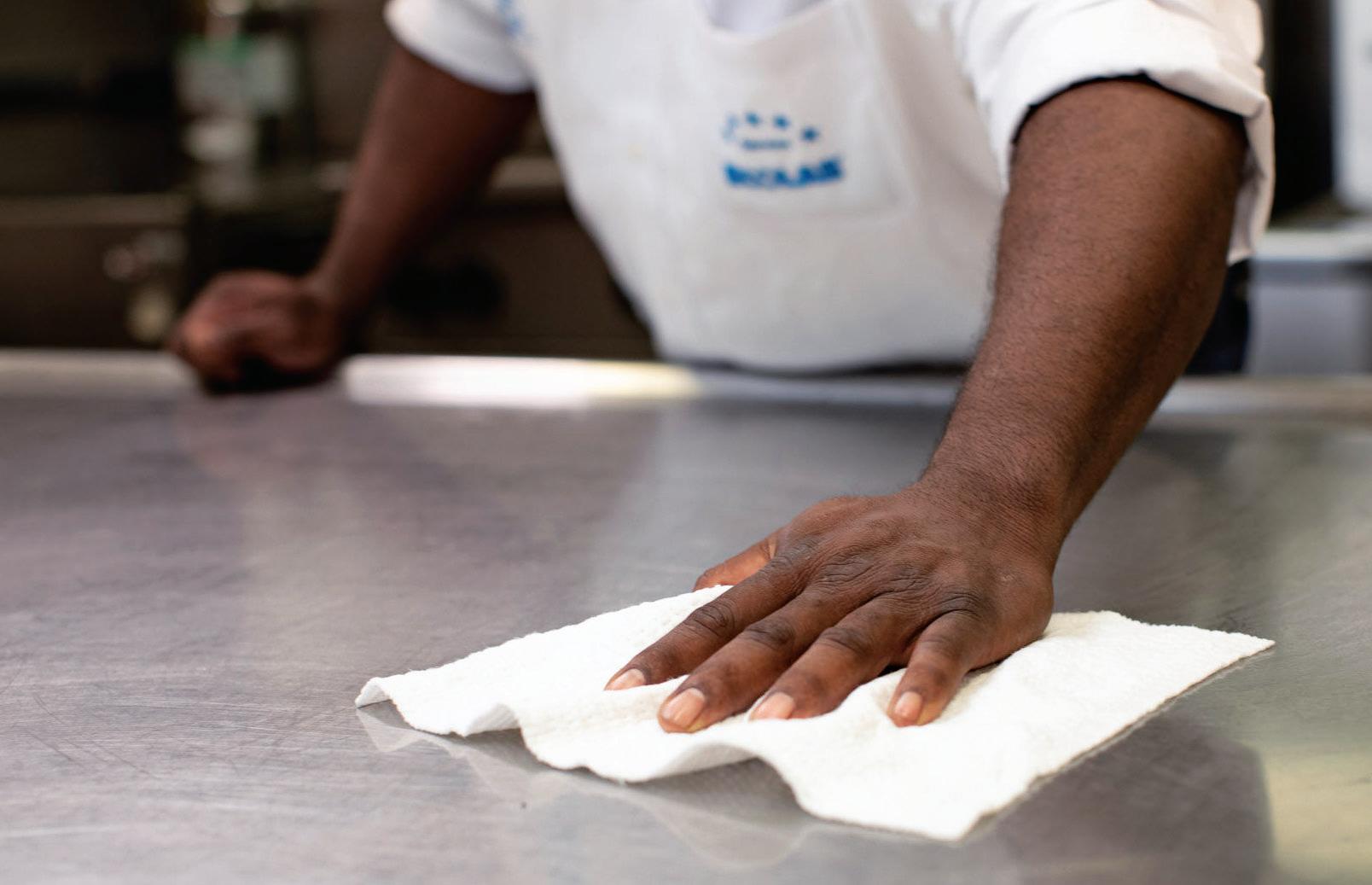
“ We tailor cleaning solutions to each business.”
ators and staff can implement them seamlessly," Molinaro says. Ecolab simplifies these tasks with smart formulations and training to save money during every second and task. From the ELT Dishmachine, which can save up to 107 minutes a day,* to the Sink & Surface Cleaner Sanitizer, which can save up to 26 minutes a day,* the Ecolab’s Labor Savers product line helps operators save money on their bottom line daily.





Personalized labor-saving solutions are only part of the equation, training how employees can most effectively use the product is the other part. "Training is a challenge in foodservice, especially with high turnover,” Molinaro says. “We offer on-demand digital training in multiple languages, accessible on smartphones, so new employees can quickly get up to speed."
Beyond accessibility, effective training must also be engaging and easy to implement. Ecolab’s digital training tools are designed to fit
seamlessly into an operator’s workflow, reducing downtime while ensuring employees retain key information. By integrating training into daily routines and providing ongoing support, Ecolab helps operators build a well-trained staff that maximizes efficiency, reduces mistakes, and upholds the highest standards of cleanliness— no matter how often teams change. Labor savings don’t just happen at scheduling and hiring, it happens throughout the day and is reflected through even the smallest tasks operators are often too busy to identify. "We focus on making solutions that are intuitive and easy to use so oper -
In an industry where every second counts, cleaning can no longer be an afterthought. With rising labor costs and heightened consumer expectations, operators must embrace efficiency at every level—including how they clean. Ecolab’s science-backed approach not only simplifies cleaning processes but also ensures that every solution is tailored to an operator’s unique needs. By reducing labor hours, minimizing waste, and enhancing overall cleanliness, Ecolab helps businesses maintain profitability without sacrificing quality. In 2025 and beyond, the right cleaning strategy isn’t just about maintaining appearances—it’s a critical factor in staying competitive.
BYYA'ELMCLOUD
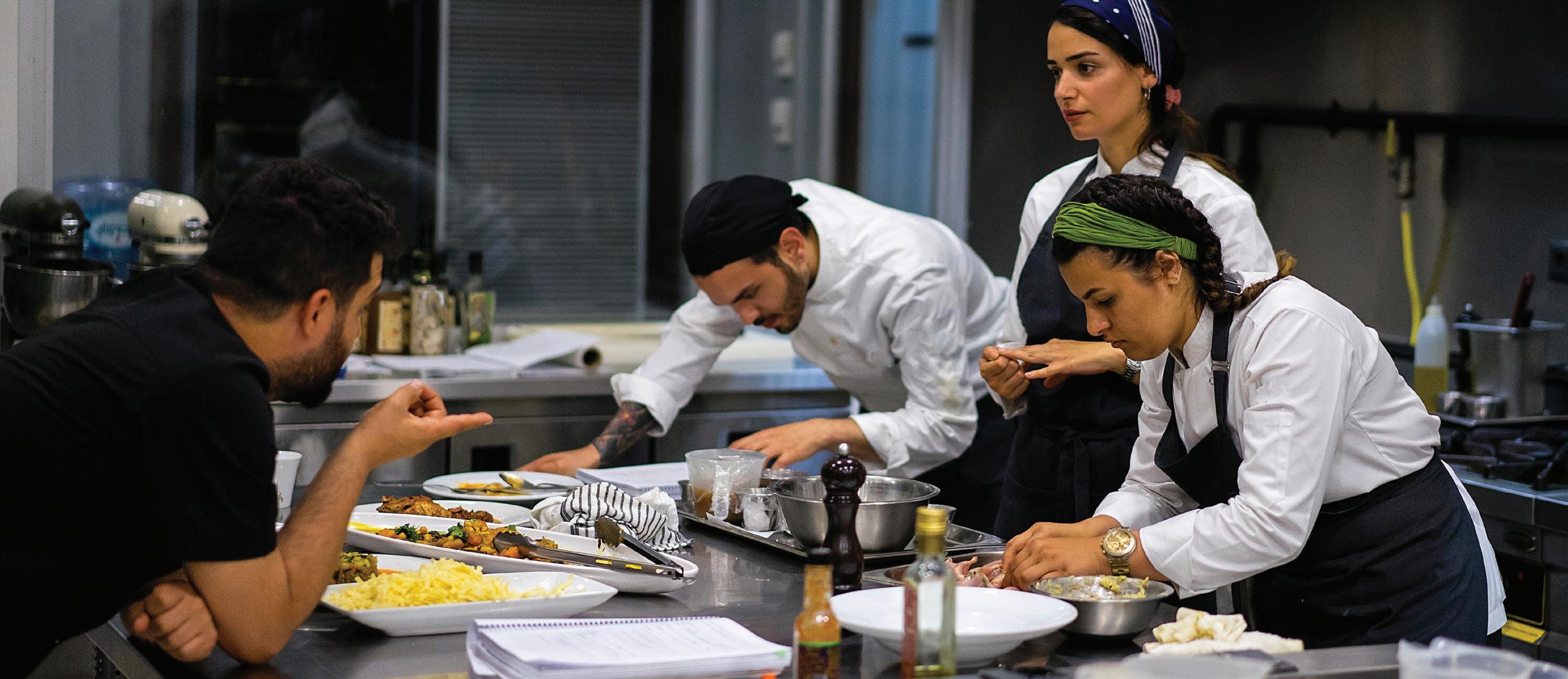
When you can clean and sanitize quicker, you can get cooking quicker. At Ecolab, we’ll work with you to create a customized program that’s right for your operation. With our Ecolab Labor Savers a collection of e icient, e ective products, you can save up to four hours a day*. And that means you’re ready to roll when the lunch rush hits.
Start your customized labor savings plan today! Streamline cleaning with these Labor Saver products!







BY SAM DANLEY
Here’s how to implement eco-friendly strategies that benefit the planet and your bottom line.
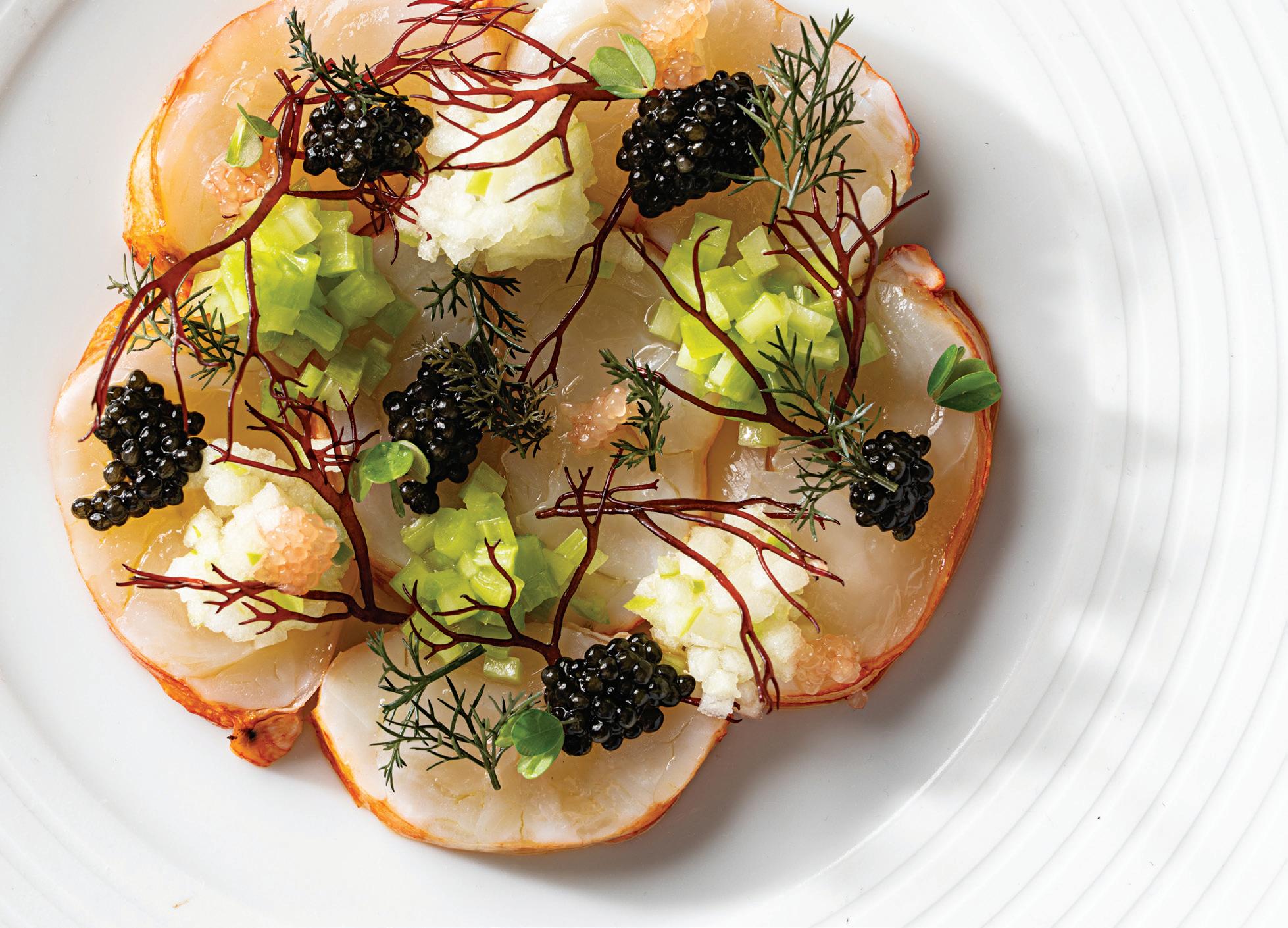
THE BIGGEST BARRIERS to sustainability in restaurants are the same challenges operators face across the board— rising costs, labor shortages, and time constraints. When keeping a business running feels like an uphill battle, sustainability can seem out of reach.
However, Juliane Caillouette Noble, managing director of The Sustainable Restaurant Association (sra ), says operators can take practical steps to reduce their environmental impact.
Restaurants should cultivate shorter supply chains, build strong producer
relationships, and focus on ingredient provenance. “Not only does this satisfy a growing desire among consumers to know where their food comes from,” she says, “but it also ensures our businesses are more resilient in the face of supply chain disruptions.”
Restaurants can make a meaningful impact by offering more plant-based options—and ensuring they’re genuinely appealing to diners.
Another key area is energy use. The SRA advocates for shifting to renewable energy, which can significantly cut
CARUSO’S PARTNERS WITH OCEANWISE, SMART CATCH, AND SEAFOOD WATCH TO SOURCE SUSTAINABLE SEAFOOD, PLUS OPERATES A FOURACRE FARM AT VEGA VINERY TO SUPPORT AGRICULTURAL DIVERSITY.

indirect greenhouse gas emissions. One change is eliminating gas and transitioning to fully electric kitchens—an idea sometimes met with resistance. Caillouette Noble acknowledges the controversy but emphasizes the longterm benefits. Beyond reducing emissions, electric kitchens lower noise, heat, and air pollutants, creating a safer, more comfortable work environment.
The third key area is tackling food
waste. “We need to create kitchen cultures where food waste is unacceptable,” Caillouette Noble says, noting that food loss and waste account for 8 to 10 percent of global greenhouse gas emissions. “Not only do we have the ability to tackle waste within our own kitchens, but finding creative ways to use every part of each ingredient can also go a long way toward inspiring our customers to take the same approach in their own kitchens.”
A common misconception about sustainability is that it’s costly and timeconsuming. “I’d argue that we need a complete shift in perspective,” Caillouette Noble says. “‘Sustainable’ isn’t a genre of restaurant, and sustainability isn’t a line item on your to-do list. It’s a lens through which you view every other item on the list, every choice you make.”
For operators looking to turn good intentions into action, the SRA’s Food Made Good Standard provides a rigorous framework. Since 2010, it has assessed and certified the sustainability efforts of over 15,000 hospitality businesses. The process requires businesses to answer nearly 200 questions and submit documents. Each business receives a report outlining achievements and next steps.
With the Food Made Good Standard serving as both certification and roadmap, many restaurants are making meaningful sustainability strides.
Caruso’s at Rosewood Miramar Beach, led by Chef Partner Massimo Falsini, is one example. The restaurant partners with Oceanwise, Smart Catch, and Seafood Watch to source sustainable seafood; operates a four-acre farm at Vega Vinery to support agricultural diversity; and uses only land proteins from regenerative agriculture. Other initiatives include an apiary producing 25 pounds of honey per month; a composting system with a biodigester to track CO2 savings; and a plastic-free policy.
For Falsini, the biggest sustainability challenge is implementing lasting change. “It’s about mindset,” he says. “You need to discipline yourself and be true to your beliefs and consistent with your program. The fun part comes when the dishes have to be produced at a cer -
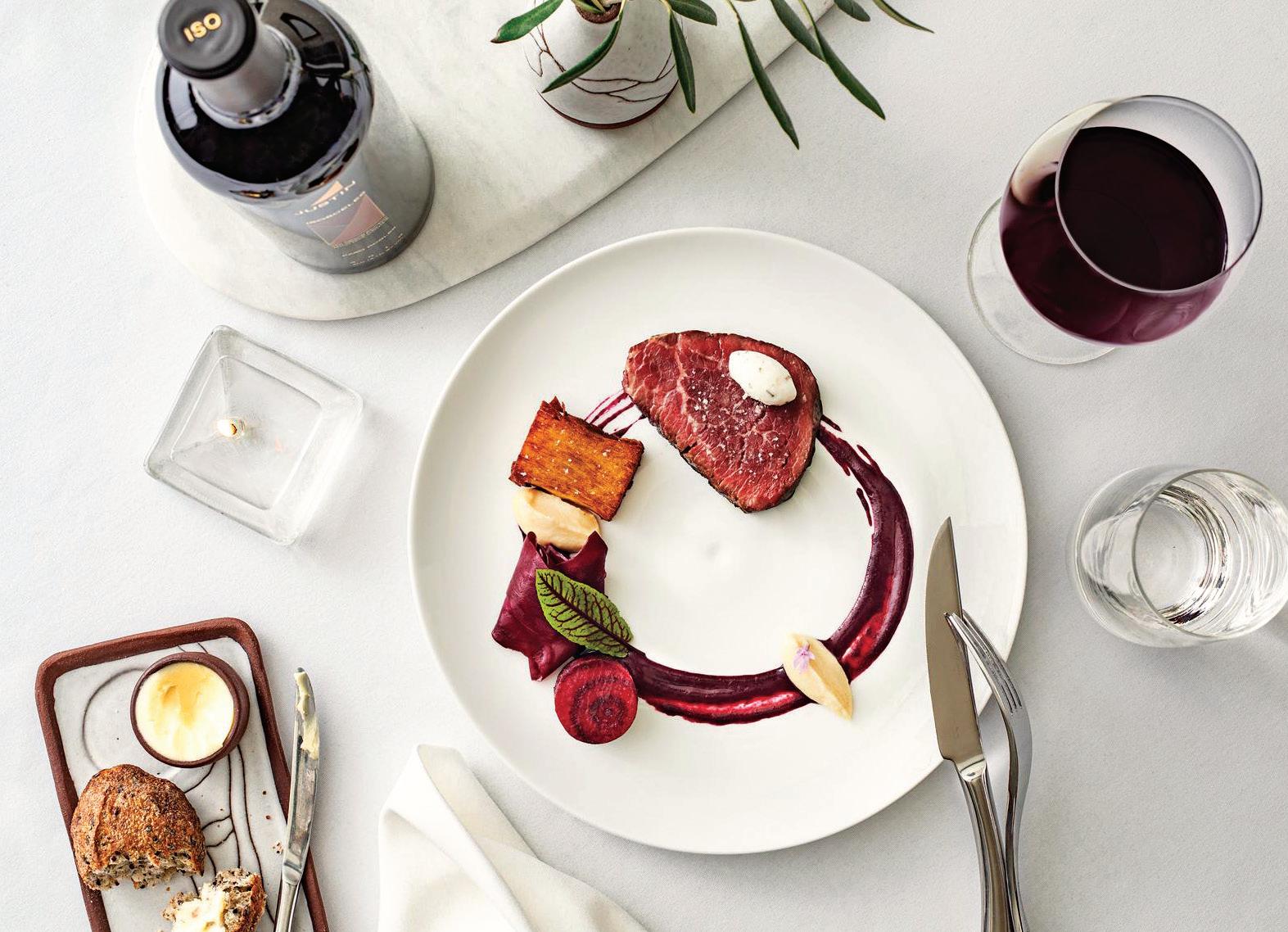
tain gastronomic level and your choices are limited—this is when the chef’s creativity and passion comes to life.”
San Ysidro Ranch is another hospitality business working toward Food Made Good certification. “Given our location in the Santa Barbara foothills ... we feel a responsibility to minimize our environmental impact and support local ecosystems,” says Andrew Caine, director of food and beverage.
San Ysidro Ranch prioritizes local sourcing, harvests ingredients from its on-site chef’s garden, and partners with purveyors committed to sustainable seafood and proteins. It also implements waste reduction programs, energy- and water-saving initiatives, and a beverage program incorporating estate-grown citrus and biodynamic wines.
One of the biggest challenges is balancing sustainability with luxury dining expectations. “Sourcing sustainable, high-quality ingredients can be challenging, and certain eco-friendly solutions require operational adjustments,” Caine says. “However, we’ve found that guests are increasingly valuing responsible dining, which reinforces our commitment.”
For restaurants looking to enhance sustainability, he advises starting small but staying consistent. “Identify one or two key areas where you can make an immediate impact, such as reducing food waste or sourcing locally,” Caine suggests. He also emphasizes partnering with sustainable suppliers, engaging staff and guests in sustainability efforts, and tracking progress to measure impact.
At JUSTIN Vineyards & Winery, Executive Chef and Culinary Director Rachel Haggstrom takes a similar approach, recognizing sustainability as both an operational necessity and longterm vision. This philosophy extends to the farmstead, where the focus is on nurturing soil and microenvironment. The team ensures that as they harvest, they also replenish, creating a self-sustaining ecosystem that attracts pollinators and beneficial insects, enhancing rather than depleting the land.
“At the same time, our philosophy is rooted in the belief that the best ingredients yield the most exceptional flavors,” Haggstrom says. “When a guest tells us, ‘I usually don’t like beets, but I’ve never tasted them this good,’ it validates our approach. It invites a conversation about why our ingredients taste better—whether it’s where they’re grown, how they’re harvested, or the integrity of the source.”
Beyond ingredients, sustainability has become a mindset across all aspects of the restaurant. The front-of-house team embraces this by curating mocktails with the same care as the wine program, decorating tables with florals and herbs from the property, and even crafting hand sanitizers from on-site botanicals.
“It’s one thing when the culinary team works with a certain ethos, but it’s another when we create a full-circle experience with the help of the front of house,” Haggstrom says. “Sustainability isn’t just about food—it’s about every touchpoint of the guest experience.”
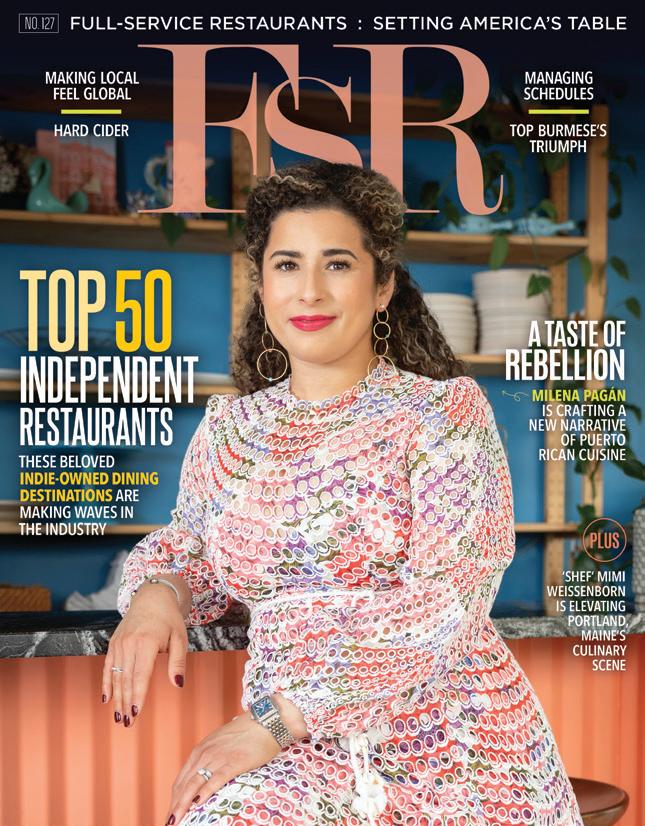
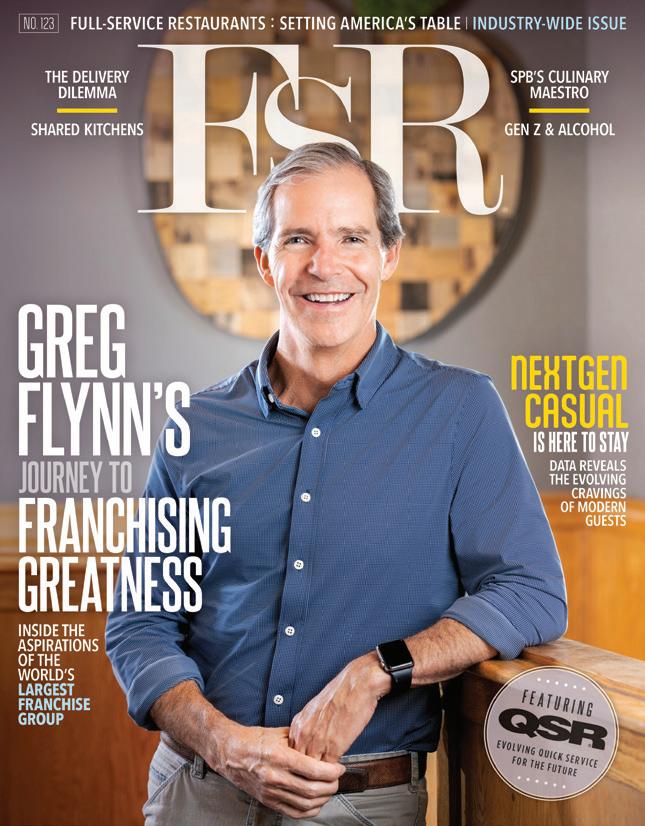
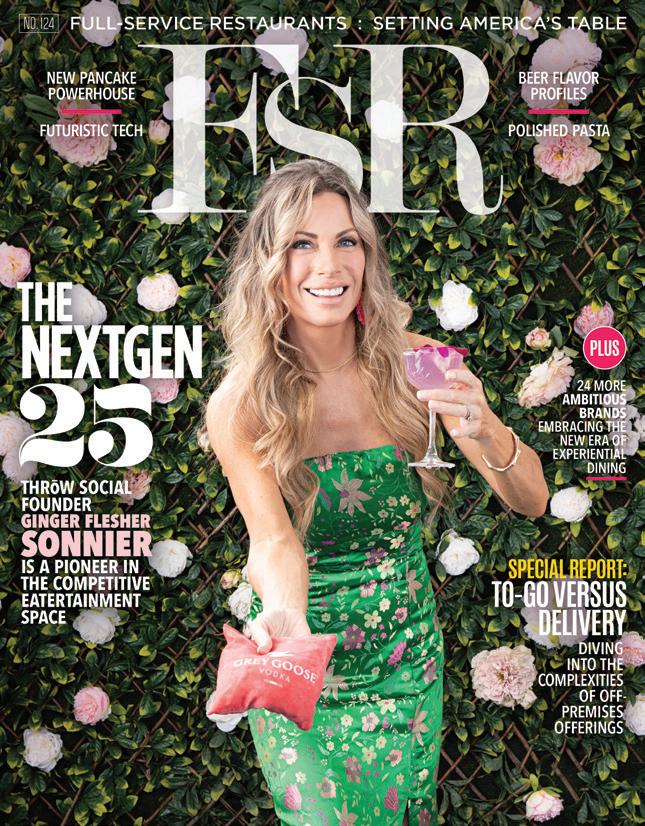
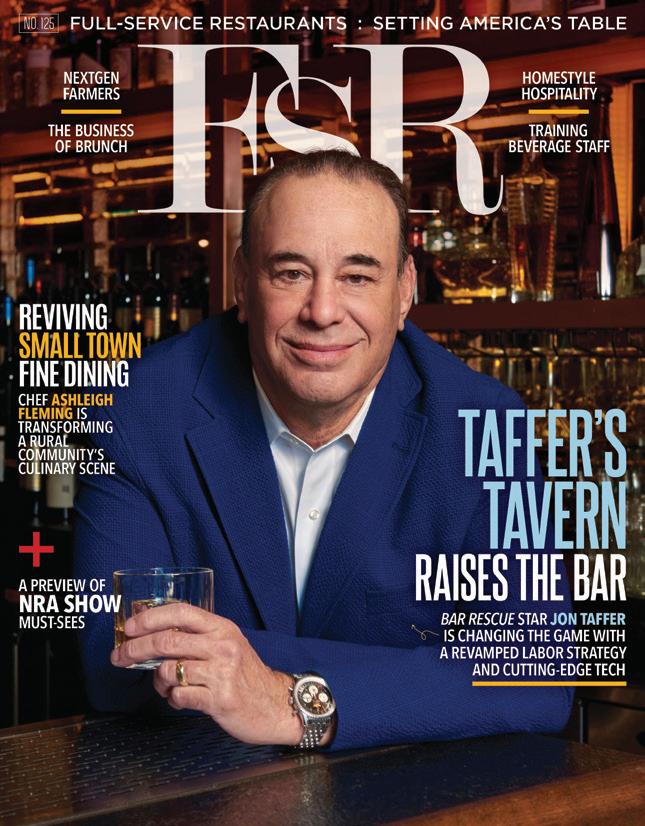
You should know—you’re one of them.
You’re what we at FSR like to call “tablesetters.”
You make things happen in the restaurant industry.
You’re an innovator on your menu and in all aspects of your operation.
You’re watched and emulated by other restaurateurs.
You lead the markets you operate in.
These are the characteristics that make a tablesetter. And FSR is the trusted source of information for these most influential chefs and restaurateurs in the industry. Request your free subscription today by visiting FSRmagazine.com/subscribe
Restaurants : Setting America’s Table
MENTIONED IN THIS STORY FLIGHT

BY SAM DANLEY
Bartender competitions can be a win-win for restaurants.
FLIGHT CLUB IS PUTTING creative control into the hands of its bartenders, encouraging them to take an active role in shaping the beverage program across all U.S. locations. The eatertainment brand recently invited team mem-
bers who work behind the bar to participate in a companywide bartender competition to craft original drinks and have those creations featured nationally. The idea originated from a program called “Take it to Toby,” which encour-
ages employees across the organization to submit ideas to Toby Harris, CEO of parent company State of Play Hospitality.
“We’ve always found that the best ideas come from the field,” says Kim Chute, VP of marketing for Flight Club. “They come from the people that are out there interacting with our guests every single day.”
Each bartender was given the chance to create a cocktail or mocktail for the winter menu, with one key guideline: The recipe had to use existing ingredients and glassware available in Flight Club venues. The general manager of each location selected a winning drink to send to the corporate office in Chicago, where Chute and other executives conducted a final taste test. Submissions were judged on presentation, flavor, ingredient selection, and the inspiration behind the drink.
In the end, Lucas Carneiro from Flight Club Houston took the top prize in the cocktail category with The Equinox, a mix of Pimm’s, Tanqueray Gin, Giffard Violette, grapefruit juice, lime juice, and lychee. On the nonalcoholic side, Joe Cattoggio from Flight Club Boston won with The Snow Angel, a blend of zero-proof spirit, lemon juice, lychee, coconut, and vanilla puree.
Flight Club announced the results during its quarterly all-team meeting, a companywide call that includes employees throughout the organization. “We showcased the drinks right there in front of the whole company before we announced
FLIGHT CLUB IS PUTTING CREATIVE CONTROL INTO THE HANDS OF ITS BARTENDERS, ENCOURAGING THEM TO TAKE AN ACTIVE ROLE IN SHAPING THE BEVERAGE PROGRAM ACROSS ALL U.S. LOCATIONS.

BARTENDER COMPETITIONS CAN SERVE AS A POWERFUL TOOL FOR BOOSTING TEAM MORALE AND STRENGTHENING COMPANY CULTURE. ERIKA FALL (RIGHT) WON BAR LOUIE’S 2024 COMPETITION AND HAD THE OPPORTUNITY TO COLLABORATE WITH LEADERSHIP ON A NEW DRINK SET ROLLING OUT NATIONWIDE THIS SPRING.
it to the world,” Chute says. “Having that internal recognition really seemed to mean a lot to those team members.”
The winning bartenders were recognized by name on the drink menu at every Flight Club location. The company also leveraged social media to spotlight the winners and share the inspiration behind their creations, using the competition to generate buzz around its seasonal drink lineup.

“We want to scream it from the rooftop,” Chute says. “There’s something really cool about having a face to a name and showcasing the team members, versus just having everything come from the company all of the time.”
Flight Club is already considering ways to add an in-person element to future iterations. The leadership team believes the competition could become an important initiative moving forward, as it gives bartenders an opportunity to express themselves while maintaining a sense of ownership over the menu.
“In smaller businesses, there’s more opportunity for everyone to be involved in the curation of the drinks,” Chute says. “We’re trying not to lose that small busi-
ness mentality and that personal touch as we get bigger. We want to make sure that our bartenders feel like they’re not just part of a huge company where they’re one of a million. We want them to feel heard and like they’re truly a part of our business.”
Competitions like this often require minimal lift from the corporate team while delivering fresh menu offerings that might not have emerged otherwise. They also serve as a powerful tool for boosting team morale and strengthening company culture.
“Finding ways to make people excited about work—that’s tough,” says Jason E. Brooks, a hospitality coach, author, and consultant. “A little competition can be very healthy, and it draws on something that we as humans already have.”
Brooks helps restaurant managers and leaders build and maintain engaged teams, emphasizing the importance of giving store-level employees an “ownerlike orientation.” That means equipping them with a big-picture understanding of the business and encouraging them to take ownership of their role.
“As business owners, bar owners, or

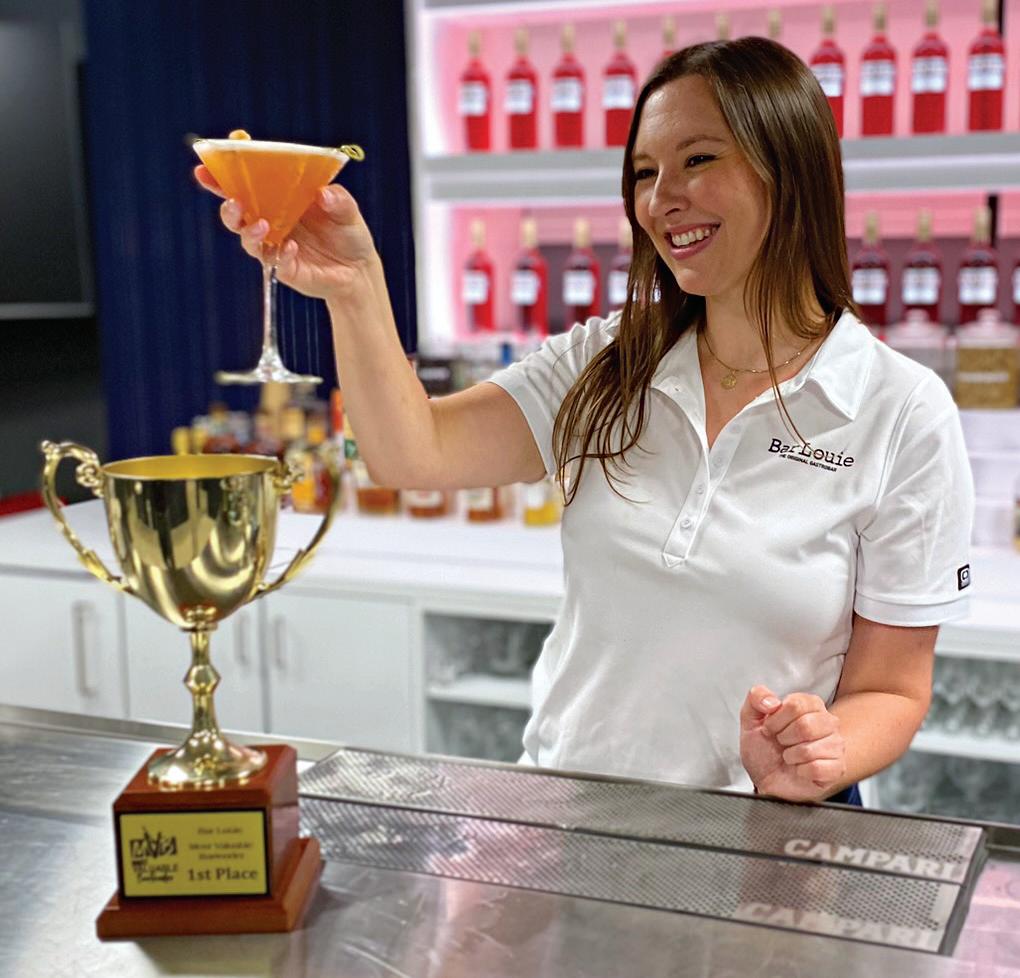
restaurant owners, we have to reorient our team every single day,” he says. “There’s a million reasons why their mind is elsewhere, so orientation is a thing we should practice all the time. Competitions are just a heightened level of implementing an owner-like orientation. We just happen to be putting glitter, sparkles, and a prize behind it.”
Bar Louie has seen firsthand how friendly competition between bartenders can make a big impact. A few years ago, Ian Welby, the chain’s VP of beverage and execution, set out to identify and recognize talent behind the bar.
“We were really more focused on the internal side,” he says. “How do we find
our best people, create a path for them moving forward, and then celebrate them publicly as well?”
The answer was the Most Valuable Bartender (mvb) competition. In its first year in 2023, Welby and his team developed selection criteria and relied on directors of operations to identify top bartenders based on in-store visits and input from general managers. Nominees then completed an online test before seven finalists were flown to Bar Louie’s downtown Nashville, Tennessee, location for a multi-phase event.
The competition included a written test, demonstrative testing, a group challenge, and a cocktail competition where finalists had 45 minutes to create an original drink using surprise ingredients. A panel of judges, including leaders from Bar Louie and sponsoring partner Diageo, selected the winner.
Elyse Perez, a bartender from Tempe, Arizona, took home the first MVB title. She was featured in a companywide spotlight with photo shoots and digital content highlighting her journey from server to champion. She also attended the Vibe Conference in San Diego and Bar Louie’s annual leadership conference in Cancun. Additionally, she collaborated with Welby to create the Wake Up Call Martini—a blend of 21 Seeds Valencia Orange, Aperol, peach, pineapple, and lemon—which landed a spot on menus nationwide last year.
For the 2024 competition, Bar Louie partnered with a new supplier and hosted the program at the Campari Academy in New York City. This time, 10 bartenders flew in for a longer event that expanded on the original format with an extra focus on education and professional development. Participants attended an intensive course on tequila and mezcal, explored cutting-edge technology in a hands-on “beverage science fair,” and wrapped up the event with a guided bar tour across New York City.
The winner, Erika Fall from Perrysburg, Ohio, will follow in Perez’s footsteps by attending the Vibe Conference and the company’s leadership conference. She also was featured on social media and col-
laborated with Welby on a new drink set to roll out nationwide this spring.
Welby sees the MVB program as a powerful tool for attracting and retaining talent while creating career pathways for high-performing team members. As the company continues growing, the competition can help identify employees ready to step into new roles.
Another key benefit is breaking down barriers between corporate leadership and store-level employees.
“Think about what sort of involvement they have with a senior member of the company,” Welby says. “Especially at the hourly level, it’s like this faceless Wizard of Oz type of thing. So, it’s really valuable for them to see that we’re just normal human beings. We can talk to them about why we made a certain decision or why we designed the beverage menu this way. I can tell them about how I used to be a bartender and show them that there are paths forward. Plus, having that one-on-one time is really great for me, because now I have 10 people out there that I know I can lean on.”
He also believes in exposing talented bartenders to the broader beverage industry. “Sometimes I get a weird look when I say this, but these incredibly talented people aren’t all going to be with us forever,” Welby says. “Can we help them anyway? Can we start to build a pipeline of talent in the beverage industry? That’s a big part of this, too.”
For others considering a similar initiative, Welby advises clarity on the competition’s purpose. “The biggest hurdle initially was figuring out what we wanted it to be,” he says. “Do we want people making drinks in front of guests? Do we want it to be purely educational? You just have to find what works best for you.”
Just as important is being strategic about the competition’s impact after it’s over; considering the story you want to tell consumers and how to effectively spotlight the winner. “You also need to think about how you’re going to celebrate people internally,” Welby says. “It’s really important to make sure your team members are getting recognized among their peers, too.”

Meet 11 women in restaurant leadership who are breaking barriers and reshaping the dining industry, from menu innovation and marketing and communications to operations, training, and mentorship at the highest levels.
that top positions at restaurants, from ownership stakes to executive chef roles, have historically been male-dominated. The barriers to entry are complex; not only are women up against internal biases and access to the right networking opportunities and traditional funding, but they also have to contend with an industry with long hours and late nights, making it even more difficult for those who choose to have children and don’t have a partner to share the load with.
Breaking the glass ceiling into the upper echelons of restaurant chains is something few women can claim, and this gender disparity is rooted in societal norms, stereotypes, and systemic biases. Efforts to address the disparities include mentorship programs, advocacy for equal opportunities and gender-inclusive hiring policies, women-centric culinary schools, industry awards and recognition, financial support and incentive programs, educational outreach, collaboration initiatives, and more. BY
SATYNE DONER AND CALLIE EVERGREEN
When FSR and our sister publication QSR created the Women in Restaurant Leadership (w i rl) platform and event, we also formed an advisory board to help inform us of the industry’s biggest challenges and opportunities. They act as our eyes and ears, allowing us to get a deeper understanding of what it means to be a woman in restaurant leadership and where there is room for meaning -
ful change. Most importantly, they play an integral role in steering the direction of the WiRL platform, harnessing the energy of its community, and welcoming new members into the fold.
As members of our WiRL advisory board, the following 11 fearless leaders are committed to elevating, educating, and empowering the full spectrum of full-service restaurants—from
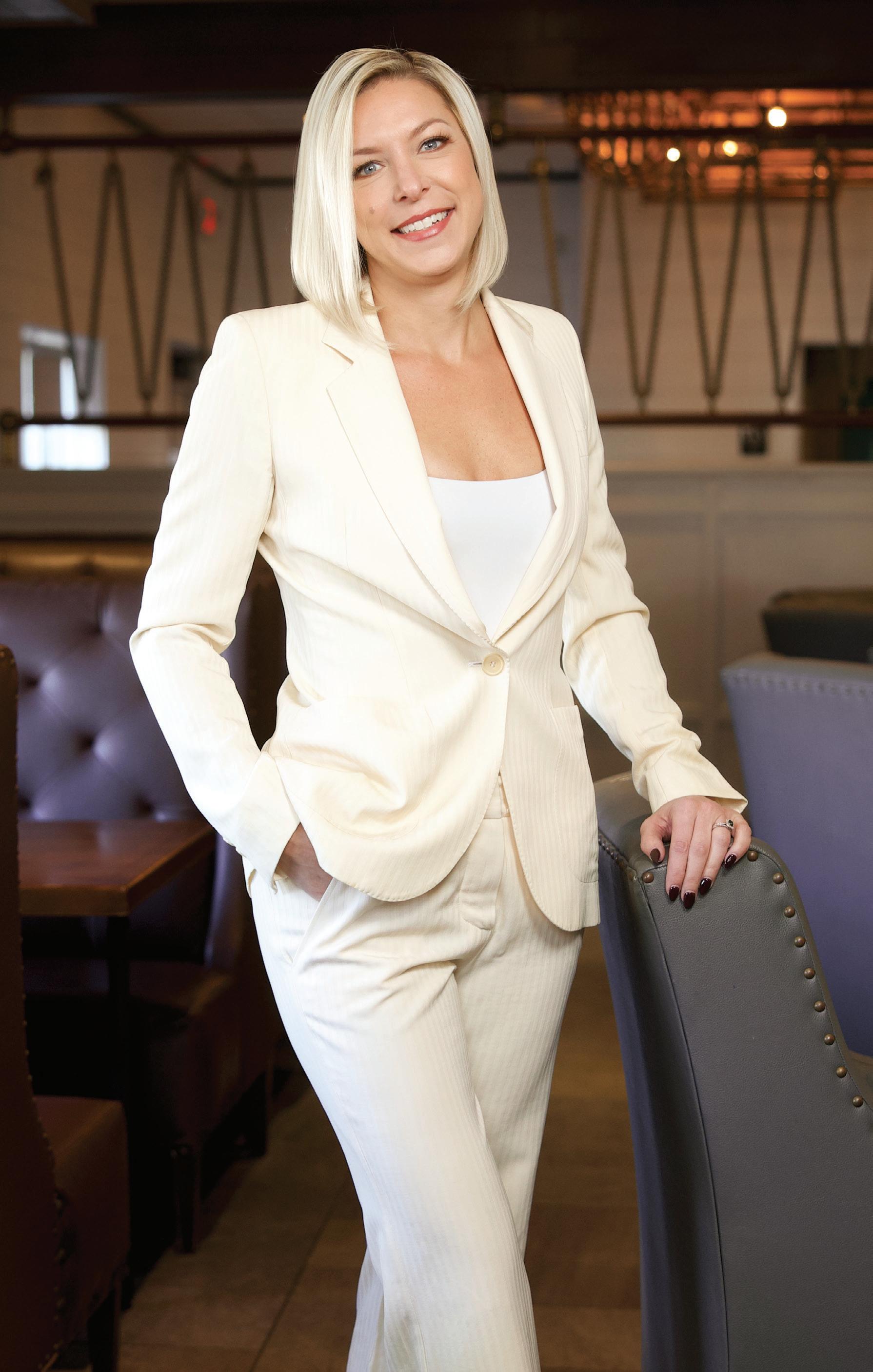
single-unit operators to multi-location brands—leaving a lasting impact wherever they lead. They come from all corners of the business, forging their own paths to success while paving the way for the next generation. Their stories unfold in these pages—serving as both inspiration and a roadmap to success, not just for themselves, but for their teams and communities.
Nichole Robillard is a brand cultivator, expert storyteller, and creative strategist, but her journey through the restaurant industry began humbly—at a bar inside a country club during college. From there, she waited tables and managed catering and events. Her career shifted when she took her experience with food and spirits to an advertising agency, where she worked with more than 15 different restaurant brands, driving growth and leading integrated teams.
While advancing her career, Robillard earned three semi-professional culinary certificates and co-owned a farm-to-table destination in Washington, D.C., called Beuchert’s Saloon. Her passion for food, flavor, and trends intersected with a knack for solving operational challenges using data.
“Opening a restaurant of my own was something I always dreamed of doing,” Robillard says. “I have all of these experiences inside and outside the restaurant’s four walls, working with all different personalities and layers of the organization. I’ve learned the power of collaboration at all levels and creating alignment and buy-in, whether you’re a CEO or a junior coordinator. It’s important to create a space where everyone feels invested and engaged.”
In 2021, Robillard was named vice president of marketing for Smokey Bones, where she spearheaded an aggressive turnaround strategy. Soon after, she was promoted to chief mar-
keting officer, launching the award-winning “Meat is What We Do” brand campaign, two virtual food restaurants, a virtual food hall, and a fully digital drive-thru. Her focus was elevating the brand through storytelling and partnerships.
“I love helping brands punch above their weight class. I always look for ways to step into a conversation around brand culture or borrow equity through partnerships where it makes sense,” Robillard says. “I love finding places where you can align a brand with something or someone with a shared ethos and spot in the broader societal culture. It has to feel organic, elevate both properties and ideally bring some fun to the table.”
In October 2024, Robillard accepted what she calls a “once-in-a-lifetime” opportunity to join CEO Damola Adamolekun in revolutionizing Red Lobster’s marketing engine. As the company’s newest chief marketing officer, she now oversees mar-


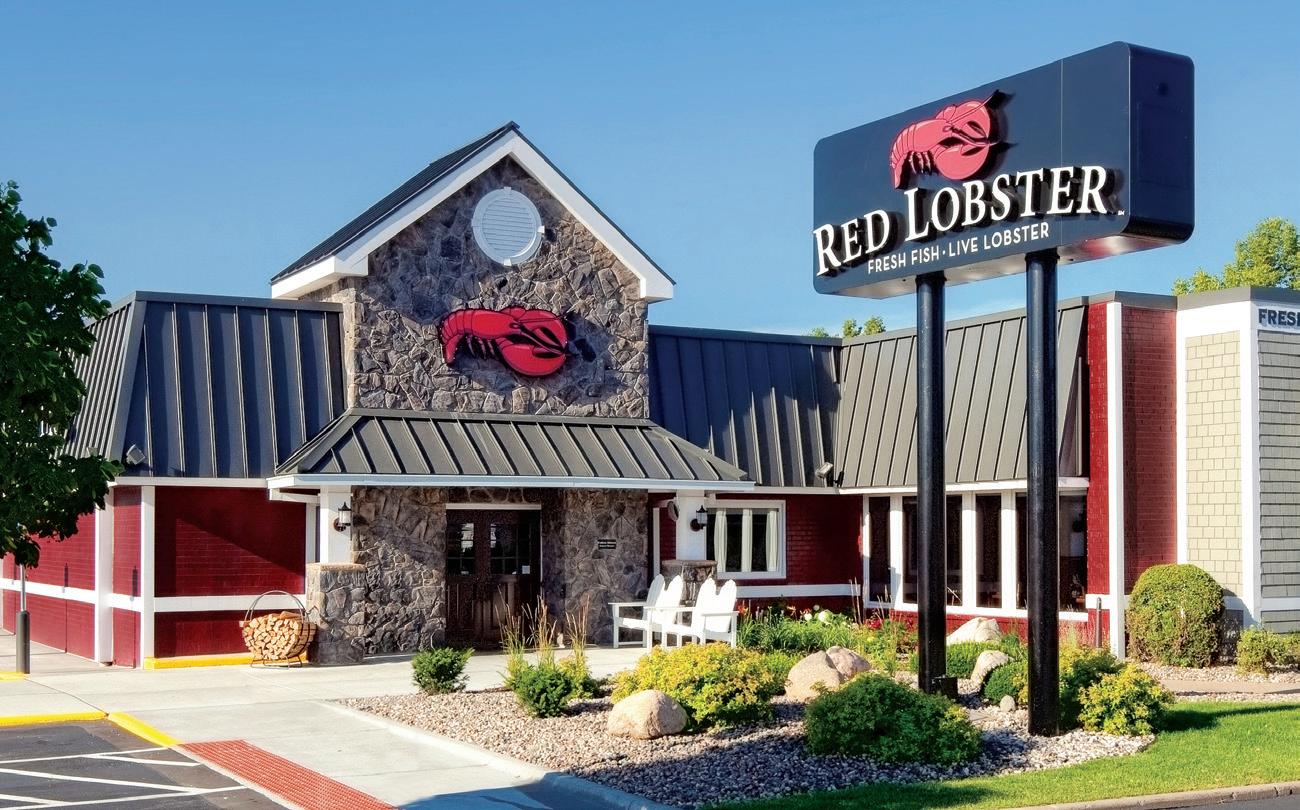
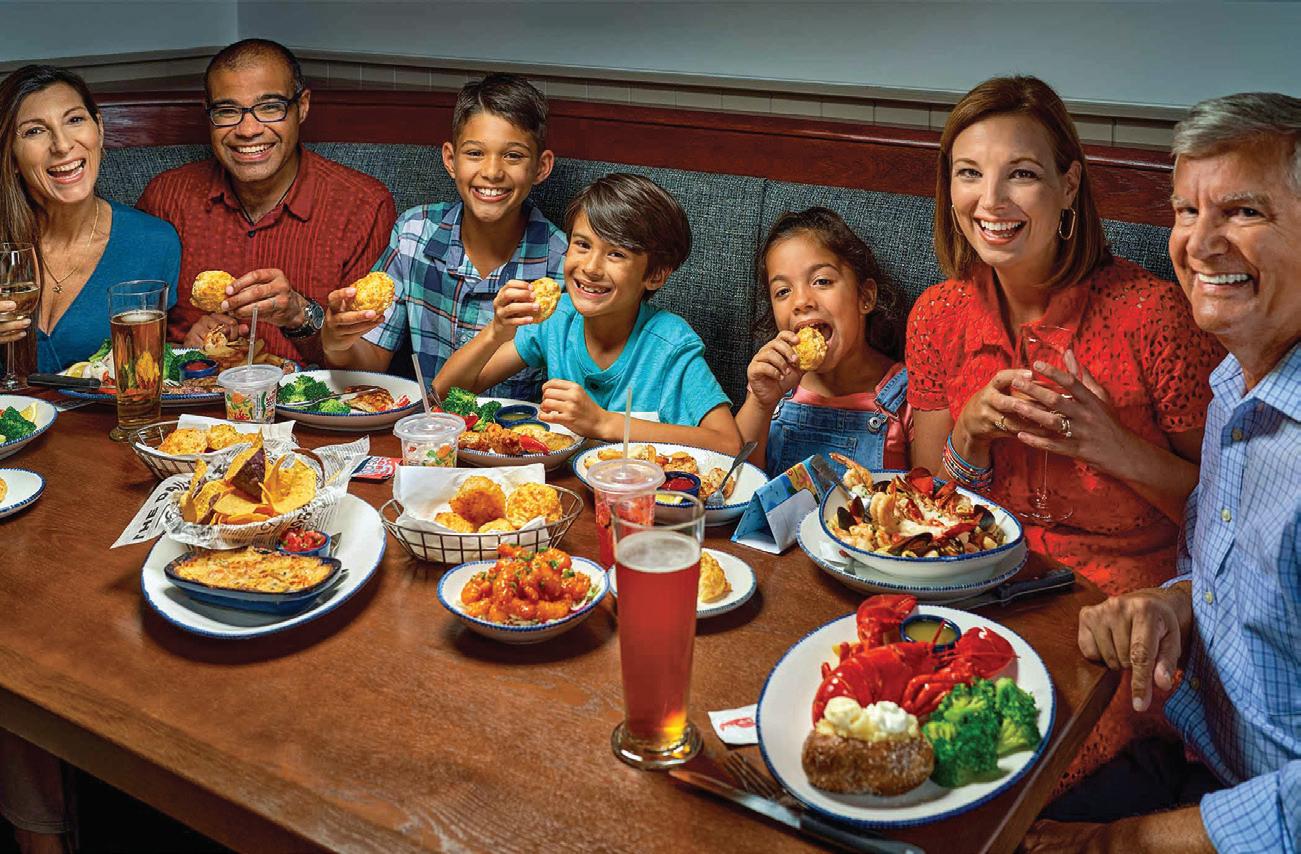

keting, communications, and culinary teams. The move came during a transformative period for Red Lobster. The 56-year-old legacy brand faced bankruptcy, 150 store closures, executive team restructuring, and a sale to Fortress Investment Group.
Despite these challenges, it still ranked 10th on the FSR Top 30 2024 Report, solidifying its sta -
tus as one of the largest full-service chains in the U.S. with nearly 650 stores and average unit volumes of $4.2 million.
Robillard is prepared to win back America’s hearts, reactivating Red Lobster’s strengths and putting the chain back at the forefront of consumers’ minds.
“You don’t get the chance to lead the greatest restaurant comeback story of all time very often,” Robillard says. “You would have a hard time finding someone without a fond memory of Red Lobster. The problem is the distance between that last visit and today … we’ve lost top-of-mind awareness, but what we’ve seen so far is that people are rooting for us, and I’m excited to harness and leverage that energy.”
Robillard notes parallels between Red Lobster’s current challenges and the ones she faced at Smokey Bones: an aging core demographic, dated storefronts, and a higher price point for the casualdining category. “I’m taking a very similar approach [to Red Lobster] because
in a lot of ways, I’m dealing with similar bottlenecks, just on a larger scale in terms of restaurant footprint,” Robillard says.
“Our marketing charge is to make the brand relevant, compelling, and exciting again,” she adds. “And that’s everything from menu development to the guest experience.”
Red Lobster has long relied on promotional windows like Lobsterfest and Crabfest. Robillard aims not only to revitalize these campaigns but also to reframe the brand’s role in today’s culture and reestablish its identity.
“We have to explore value in a way that means something for our guests and still reflects who we are as a brand. We’re focusing on creating new occasions for our guests by capitalizing on relevant culinary and beverage trends and injecting more fun into our programs,” Robillard says. “Our guests are looking for more than just a special occasion. We already own special occasions, but how can we create those everyday special moments, something little that is worth celebrating that doesn’t require a whole fancy meal and expensive check?”
In her first six months on the job, Robillard has helped launch a new happy hour program, an everyday value menu, and identified several smaller sub-segments of customer bases to tap into, including sports partnerships. She led a significant activation in December by team -
ing up with ESPN’s 2024 Band of the Year HBCU National Band Championship—a title sponsorship that will continue into 2025.
“It’s time to start a new chapter. We have a team that wants to break outside of the mold and be unconventional, which is rare for a brand with a 50-plus-year history. It’s rare to have a leader who tells us to take our dreams and run with them,” Robillard says. “We have the opportunity to take chances, take big swings, and do things differently to turn this brand into something people want to connect with and be a part of.”
As a founding member of the WiRL Advisory Board, Robillard mentors women in the industry, helping them grow their careers. She has seen firsthand the impact of community outreach, networking, and advocacy.
“My story is not one of luck. I set my intentions and I worked like crazy toward them. If you want to grow into a place of power and authority, make sure it’s an industry you want to be a part of. Making an impact on others requires passion and connectivity,” Robillard says. “You can make a difference at every level … I’ve had people in coordinator roles make dramatic impacts on me. I learn something from my team every day, and it’s important to surround yourself with a community of people who challenge you to be better and, most importantly, have fun.”
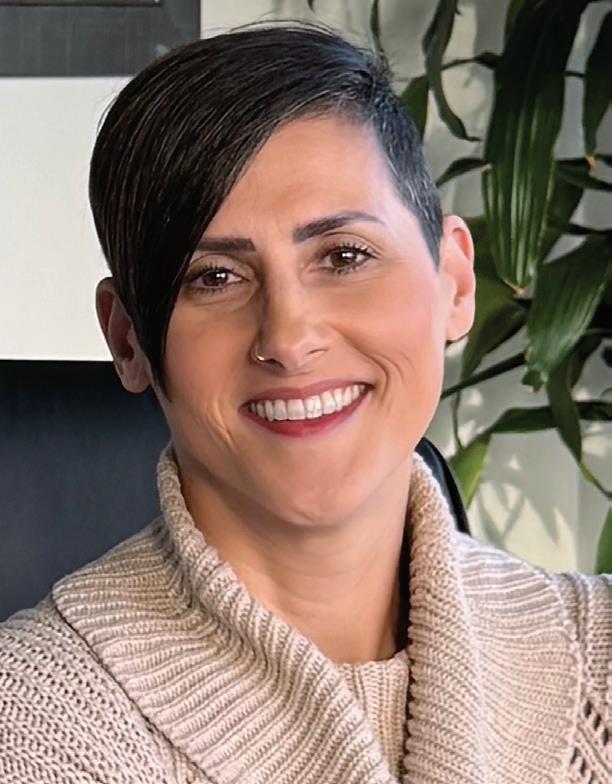
Bonnie Iavaroni has played a pivotal role in shaping Turning Point Restaurants into a thriving NextGen Casual breakfast, brunch, and lunch concept. As COO, she has focused on building leadership from within, fostering a culture of mentorship, and ensuring women have access to opportunities that allow them to excel in the hospitality industry.
One of her most significant contributions has been the development of Turning Point’s Growth Path Program, designed to identify, train, and promote employees into leadership roles. “One example that stands out for me of a time when my leadership positively impacted
our team and organization was during a period of growth when we were struggling to find qualified manager candidates,” Iavaroni says. Recognizing that many employees lacked clear pathways to management, she developed a program that included assessments to identify leadership potential and a structured curriculum guiding employees from entry-level roles to management.
“A key highlight of this program was that it encouraged collaboration among our district managers. I asked them to work together to help create the framework for the program, which not only leveraged their on-theground knowledge but also gave them a sense of ownership,” she explains. The impact was immediate: “After rolling out the program, we were able to promote approximately 20 employees into management positions, which was five times higher than the previous year.”
She adds, “The program created a culture of

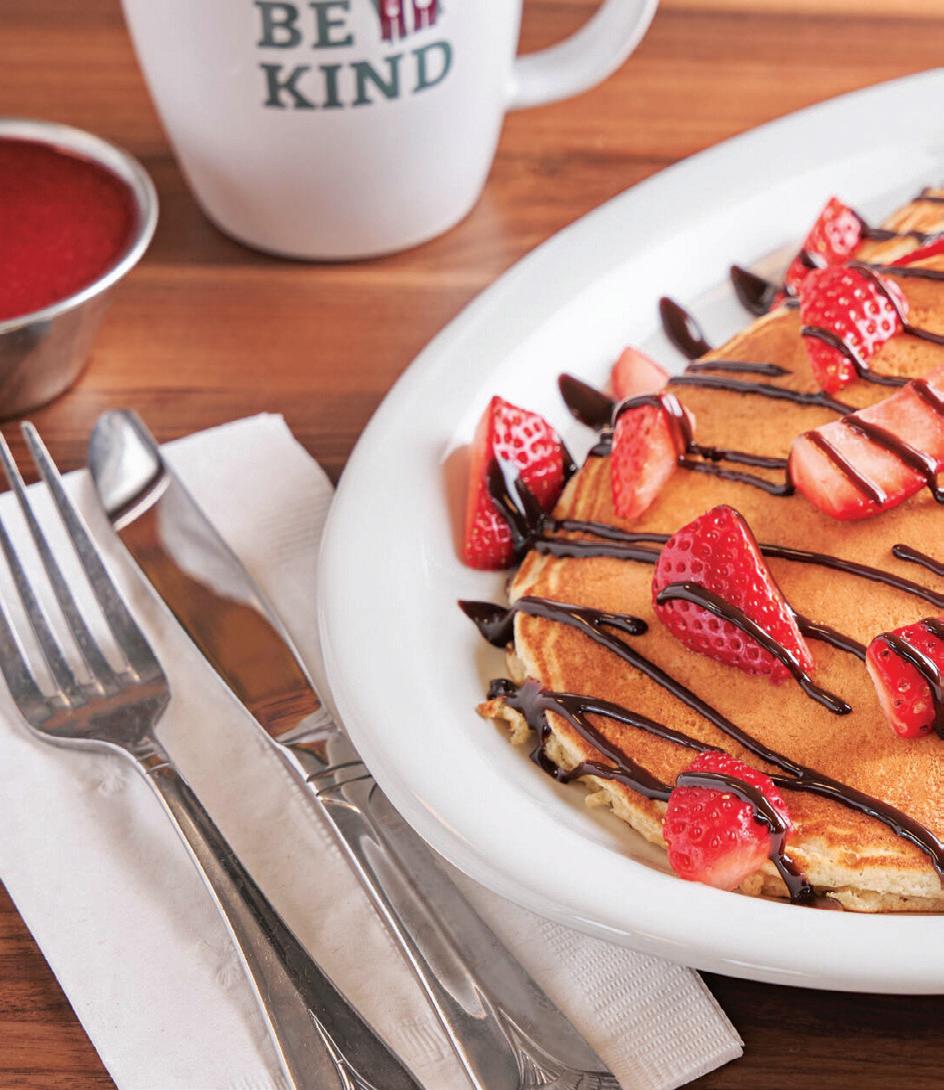
growth, mentorship, and opportunity, and most importantly, it significantly strengthened our leadership pipeline.”
For Iavaroni, fostering environments where women can thrive in leadership roles means ensuring equity in opportunity, mentorship, and worklife balance. “It’s important for women in leadership positions to actively mentor and sponsor other women in the organization,” she says. “Encouraging women to take on stretch assignments and leadership projects helps build their experience.” She also highlights the importance of flexibility: “Offering flexible schedules and support for worklife balance is essential. This ensures that women can pursue leadership roles while balancing other responsibilities.”
Turning Point has long been a champion of women in leadership, and Iavaroni is proud of the company’s commitment to equity. “We’ve never had gender pay gaps, and there has always been a concerted effort to ensure that women are given the same opportunities for growth and advancement

as their male counterparts,” she says. “By fostering an inclusive environment, we’ve been able to create a supportive workplace where all employees, regardless of gender or background, feel empowered to rise to leadership positions.”
Looking ahead, Iavaroni hopes to see more women in executive roles and systemic industry changes that prioritize pay equity, leadership pipelines for women, and family support policies. “Women in hospitality leadership roles need to be more visible. It's important for aspiring leaders to see successful women at the top to inspire confidence and demonstrate that leadership is attainable for them too,” she says. “More robust family leave policies and caregiver support systems can help women remain in leadership roles or return to them after taking time off for family obligations.”
By prioritizing mentorship, diversity, and leadership development, Iavaroni continues to drive
Turning Point’s success, ensuring women in hospitality have the support and resources they need to thrive.


PRESIDENT
American Food Co. (Ascent Hospitality)
Mindy Armstrong’s team describes her leadership style as positive and people-first. She makes it a priority to remind them that “we’re all just humans trying to do good work,” taking the time to listen and genuinely believe in their potential.
“Leadership isn’t onesize-fits-all. We get caught up in the idea of what we think a leader should look like, but it’s really about how they make us feel— empowered, capable, confident, heard, and valued. That is the environment I want to create for my people,” Armstrong says.
At the launch of Perkins’ new flagship menu in January, Armstrong had an emotional moment as she watched her team’s hard work come to life. She saw firsthand how months of collaboration—cheering each other on, asking tough questions, sharing honest feedback, and going back to the drawing board—had paid off.
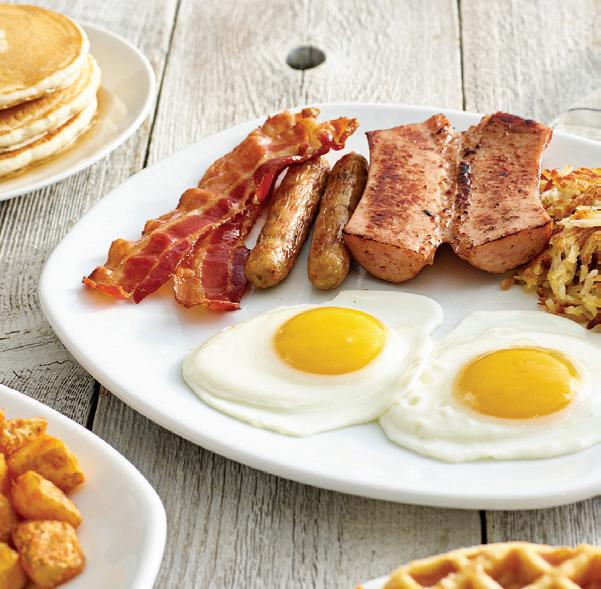
“The excitement I feel for the future of this brand had clearly transferred to our team, who will bring the vision to life for our guests,” she recalls. “It was a powerful reminder of the incredible impact we can have when we all rally around the possibilities.”
“I think of many moments in my career, standing in front of a team, a whiteboard within reach, to solve a problem, to lay out a plan, to design an innovation process, to work through a problem. With a marker, a plan, and the courage to face what wasn’t working, my team and I found a way forward,” Armstrong adds. “These impactful moments
are often born from challenges and are so important for growth.”
Across the industry, more women are stepping into C-suite and leadership roles, and Perkins is no exception. Surrounded by a diverse and inspiring team, Armstrong hopes to see more brands foster this kind of culture. “Let’s not forget the power of representation. We need to see more trailblazers and trendsetters who inspire future female leaders,” she says. “I’d love to see hospitality brands continue mak-

ing strides in supporting women entering leadership roles. It all starts with internal training programs and ensuring equal opportunities for advancement.”
Armstrong adds, “Leadership is daily. Cheering, pushing, listening, picking up the phone, checking in after a hard day, asking hard questions, sharing tough feedback, influencing outcomes rather than forcing the one you want, the ‘let’s figure it out’ approach, making the time even when it doesn’t feel like you have one second to give. Hearing from past team members reminds me of the value of showing up, being present, and believing in the people around you.”
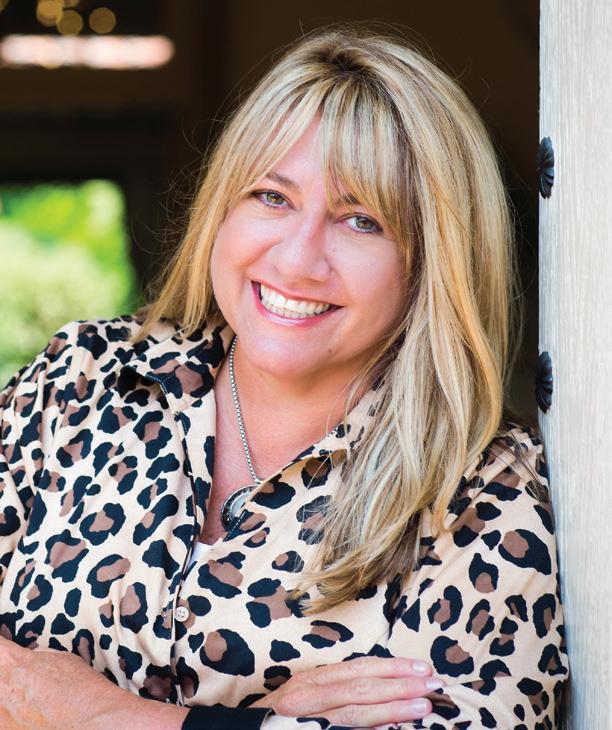
After nearly 10 years at Firebirds Wood Fired Grill, Tammy Calhoun has the opportunity to reassess the brand’s opening process and develop a system that supports growth. Her blended approach to training and development equips team members with both the tactical skills needed for operations and the core mission and values essential to creat ing extraordinary experiences for employees and guests. Representation at every level of leadership is crucial to fostering an environment where women in the restaurant industry can thrive. Calhoun encourages senior leaders to lay
Tammy Calhoun VICE PRESIDENT OF LEARNING & NEW RESTAURANT OPENINGS Firebirds Wood Fired Grill
the foundation for future leaders. “It starts at the top,” she says. “I believe it’s crucial to have representation at every level of leadership within an organization. And once leaders reach those higher levels of management, they need to ‘keep their door open’ for others and be willing to mentor and coach to help lay the foundation for tomorrow’s leaders.”
She also believes the future of full-service dining hinges on flexibility— especially for women stepping into leadership roles in hospitality.
“I’d love to see companies embracing more flexibility in the workplace. We’ve seen the acceptance of flexibility, particularly in corporate environments, ebb and flow quite a bit over the past several years, during and after the pandemic,” she says. “The work is evolving more quickly than ever, and I believe people are now working to live rather than living to work. The workforce and organizations themselves would benefit from more companies exhibiting trust by embracing flexibility.”
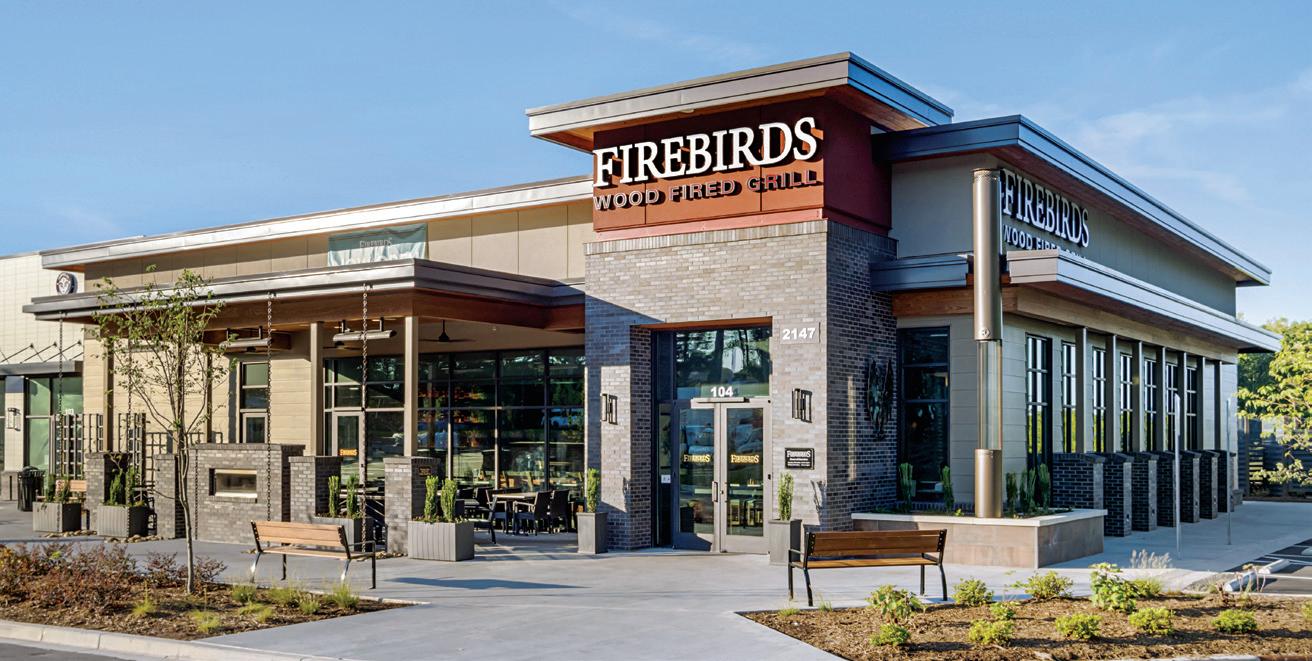


Caroline Skinner has built her leadership philosophy around resilience, opportunity, and a deep investment in people. As COO of Tupelo Honey, she has played a key role in scaling the brand to more than 20 locations across the country, while ensuring that people remain at the heart of its growth.
“For better or worse, I think some of my most effective leadership moments have happened during adversity,” Skinner says. One such moment came during the height of the COVID-19 pandemic, when uncertainty threatened the industry and the Tupelo Honey team needed a rallying cry. “I remember putting out a tag at the end of one of my messages about how we would overcome COVID as a team and be better on the other side,” she recalls. “That tag #OneTeam sparked so much momentum. People started using
shines when the odds are against us.”
That ability to unite and inspire her team has been a defining trait of Skinner’s leadership, particularly in her work to cultivate an environment where women can thrive in restaurant leadership. “Give opportunities ahead of readiness,” she advises. “What I mean by that is that often women will hold themselves back from taking on projects or responsibilities until they are 110 percent ready.”
something every organization can do better at.”
the phrase in emails, during their meetings, and taking photos with One Team signs. It really defined the moment for us and gave us something to rally behind.”
She adds, “I always love a good underdog story, so I think my leadership really

“At Tupelo, I’ve always had the opportunity to do more—sometimes those opportunities came before I thought I was ready, and it challenged me to figure it out along the way,” Skinner continues. “Unless you test your capabilities, you never truly know what you are capable of, but creating those opportunities for women to step into is


For Skinner, the future of women in restaurant leadership will be shaped by continued conversations and policy changes that acknowledge the challenges women face. “I think one of the greatest things that can be accomplished is to open up dialogue about what it means to be a woman in leadership,” she says. “In my early career, I never really saw women in roles of leadership, so I had no frame of reference for things like navigating maternity leave, being a woman in the boardroom, speaking up, and owning your unique voice as a woman.”
She points to her own experience as an example of how policy changes can create lasting impact. “My first maternity leave (almost nine years ago), we had no company-paid paternity leave. After my leave, we implemented a paid leave policy. Hundreds of people after me, and myself with two other pregnancies, all got the benefit of that policy change. While there is still so much room to grow, I think giving women space to share and learn from other women is so critical to seeing more leaders rise to the top.”
As Skinner prepares to step into Tupelo Honey’s future CEO role, she’s committed to a workplace where her staff—especially young women—feel supported and empowered to succeed, both in the restaurant and beyond.
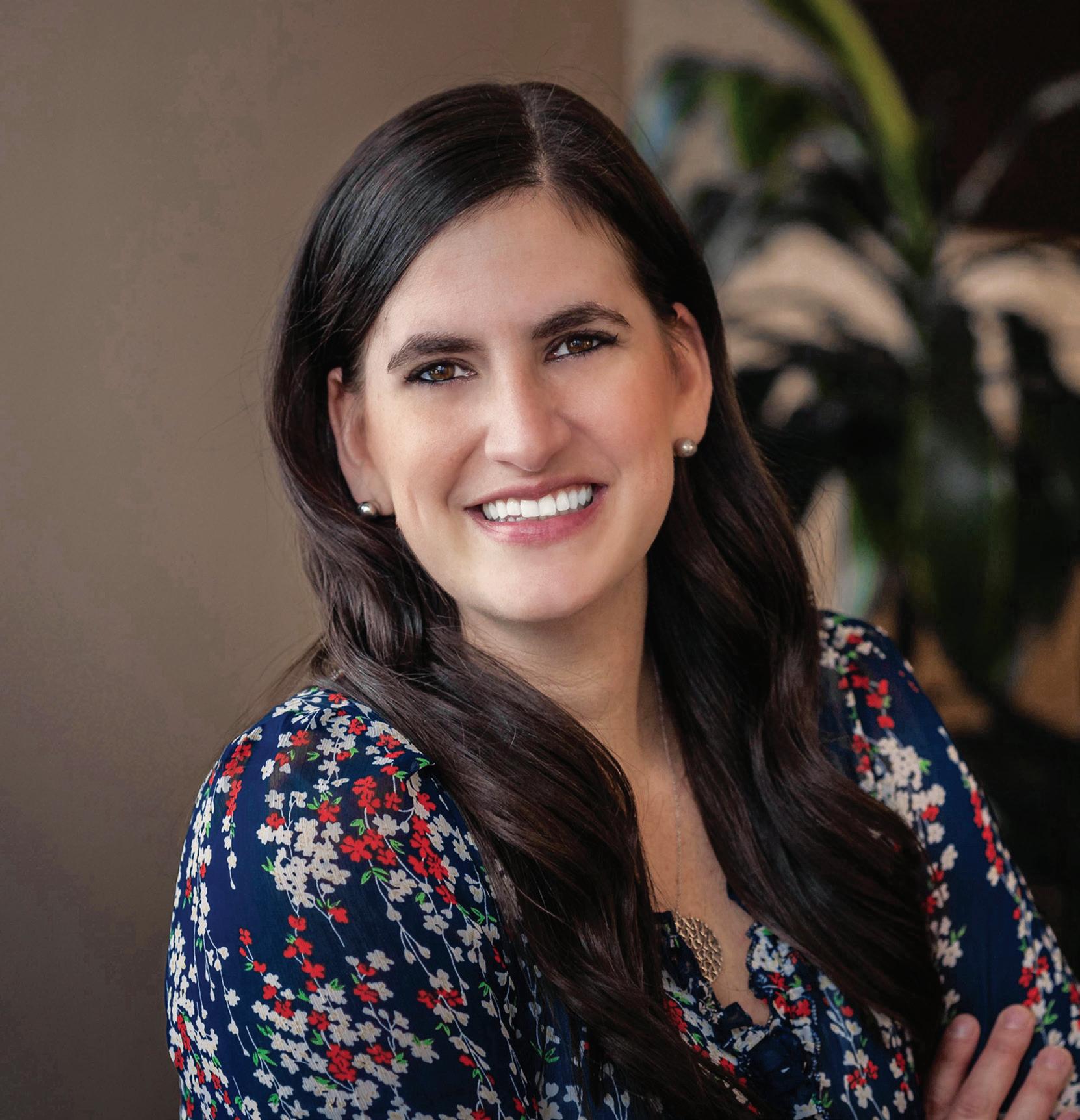
PRESIDENT,
Buffalo Wild Wings (Inspire Brands)
Rachel Richal’s leadership style is naturally collaborative, strengthened by the diverse backgrounds of her team. She has honed the ability to leverage their collective talents to develop processes, programs, and communication strategies that drive the brand’s growth—particularly when Buffalo Wild Wings introduces new products and initiatives from a team member’s perspective.
“I love bringing people together, both on my team and externally, to tap into specific strengths while also giving people projects to collaborate on and grow their skills,” Richal says. “Then, of course, there is the celebration when we have success.”
That emphasis on collaboration has played a key role in Buffalo Wild
ter an environment where women thrive is to cultivate a genuine sense of inclusion. Both Inspire Brands and Buffalo Wild Wings have employee resource groups dedicated to bringing women leaders together and catalyzing development and growth.
Wings’ ability to streamline how new products and programs are launched in restaurants.
Recognizing the need for a more effective rollout process, Richal worked alongside marketing and field teams to create a launch framework that met the needs of all stakeholders while keeping the restaurant teams— those responsible for executing the initiatives—at the center. By focusing on efficiency and clarity, they were able to reduce unnecessary meetings, refine communication, and build intuitive tools for operators, ultimately creating a more consistent approach to launching and sustaining brand initiatives.
Her biggest piece of advice for restaurant brands looking to fos-
“Restaurant brands can cultivate environments where women thrive by creating a genuine sense of inclusion that gives women leaders or aspiring leaders confidence; confidence in capabilities, confidence in belonging, confidence that they are trusted and valued, and confidence that career growth is just as valued as other personal priorities,” Richal says. “It is giving more women a seat at the table and then ensuring they know that seat is earned and valued.”
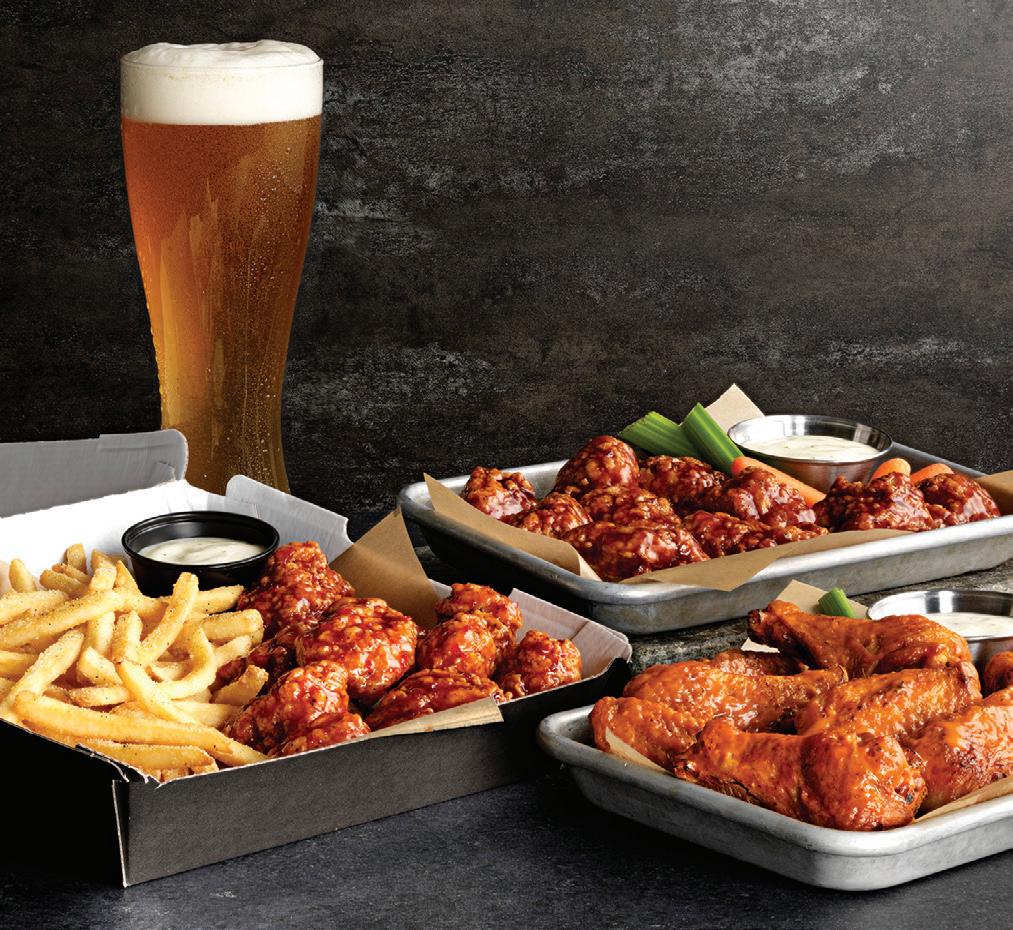
For Richal, one of the most effective ways to build that confidence is through mentorship. She believes leaders have a responsibility to identify and uplift emerging talent, helping women see opportunities they may not have initially envisioned for themselves.
Her own career trajectory—from an hourly restaurant job to an executive leadership role—was shaped by leaders who saw potential in her, pushed her to take on new challenges, and provided her with the tools to succeed.
“Mentorship is critical for any woman in the industry who wants to grow and thrive in her career,” she says. “To support the next generation of leadership, current leaders need to actively seek talent who they can encourage to take on new roles, projects, and challenges, rather than waiting for women to approach them first.

Understanding a mentee’s skillset and fostering their growth can unlock pathways that neither person may have realized could exist.”
Looking ahead, she hopes to see more brands take a proactive approach in fostering female leadership, whether through structured mentorship programs, internal training initiatives, or networks like Inspire Brands’ Champions of Women Leaders group. “Our Buffalo Wild Wings teams have regional chapters to ensure this group’s impact reaches leadership in the restaurants and in the field,” she says. “Across our support centers and in our restaurants, the group is a catalyst for development and a commitment from Inspire to invest in our growth.”
“Imagine if everyone was invested in identifying and supporting the next woman in leadership,” Richal says. “Simply starting a conversation and encouraging women to take on challenges helps them build trust in themselves and advance in their careers.”

Julie Zucker CHIEF MARKETING OFFICER Branded Hospitality
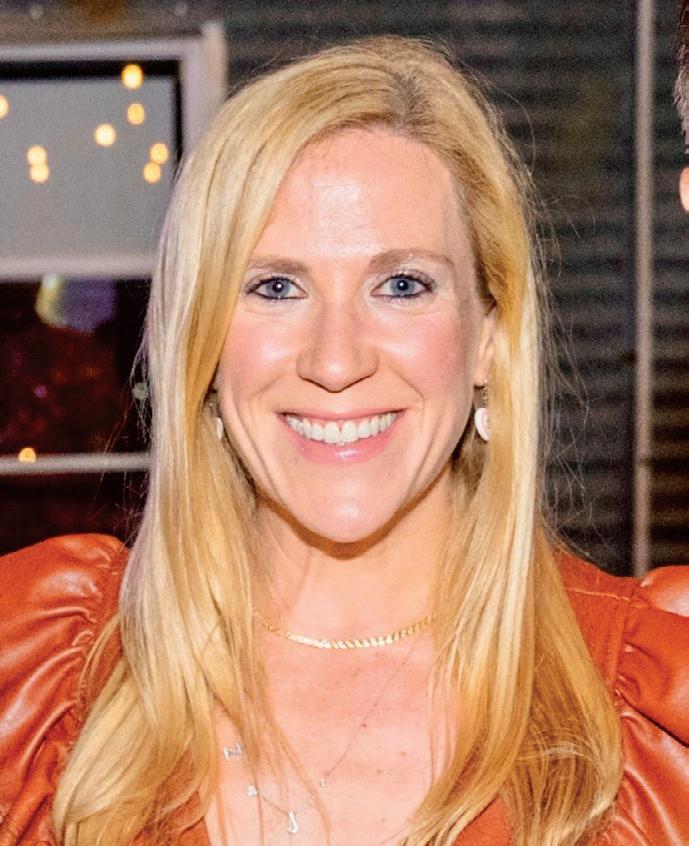
Vulnerability is a core facet of Julie Zucker’s leadership style. She recognizes how personal lives deeply impact professional ones and fosters an open, honest workplace culture where her team feels safe to share both struggles and successes.
“This openness and encouragement have created a positive ripple effect on my team,” Zucker says. “It’s not just about managing work—it’s about empowering each person to live their fullest lives and, in turn, bring their best selves to the table.”
Early in her career, Zucker was often the only woman at the table—not due to a lack of qualified candidates, but because women weren’t applying for those roles. Many remained in front-line positions such as servers, hosts, or bartenders, believing that was the ceiling for them. “When I first started working in restaurants, I was often the only woman at a table full of

FOH managers and BOH KMs and chefs,” she says. “It quickly became clear to me that the issue wasn’t that women couldn’t hold these positions or weren’t qualified—it was that they weren’t applying for the jobs.”
By promoting from within and allowing servers to explore leadership roles, Zucker has seen positive change take root in the industry. It has created an environment where young women can envision long-term careers, progressing from server to social media manager to chief marketing officer. “That one small shift changed everything,” she says. “Soon, there were more women around that weekly managers’ meeting table, bringing fresh perspectives and proving they belonged there.”
To drive meaningful industry change, Zucker believes the conversation must start with redefining, reprioritizing, and rewriting the approach to child -
care and parental support. Early in her career, she opted against culinary school and a corporate path because she knew she wanted a family someday. Now, she’s working to change that conversation—encouraging restaurant brands to implement programs that allow women to build both their families and their careers.
“While today there are so many incredible women chefs who prioritize motherhood and speak openly about their experiences, back then, I didn’t know their stories—or think that could be me,” she says.
Zucker wants to see the industry reimagine how it approaches childcare and career development for working mothers. “Consider this: The average cost of childcare in the U.S. is about $18,866 per child, and for infant care, it’s closer to $22,350. These costs are simply unattainable for many people, which means we lose incredible employees—
people who want to work but literally cannot afford to,” she notes.
She also believes paid family leave and remote career advancement programs could be gamechangers, ensuring that women don’t have to choose between career growth and starting a family. Systemic change, she argues, could take the form of childcare support, paid leave, and flexible career advancement opportunities—ensuring more women thrive and see themselves in leadership roles.
“Imagine if the industry created programs that allowed women to build their families and their careers at the same time,” she says. “What if there were initiatives for hourly workers, such as paid leave paired with remote training programs to help them learn corporate management skills or advance their careers from home?”
For Zucker, these systemic changes are essential to ensuring more women see a long-term future in hospitality leadership. “If young Julie— standing at the crossroads of culinary school—could have taken the concern about balancing parenthood and work out of the equation, how different might her path have been?” she reflects. “While I believe I’ve ended up exactly where I’m meant to be, it would have been empowering to know that starting a family didn’t have to influence my career decisions.”
Melissa Hariri VICE PRESIDENT OF COMMUNICATIONS OF DINE BRANDS
Melissa Hariri wears many hats. As a communications leader, she is responsible for promoting and protecting the brands she works with, shaping company culture, influencing business decisions, and giving back to communities nationwide.
A defining moment in her career was leading the
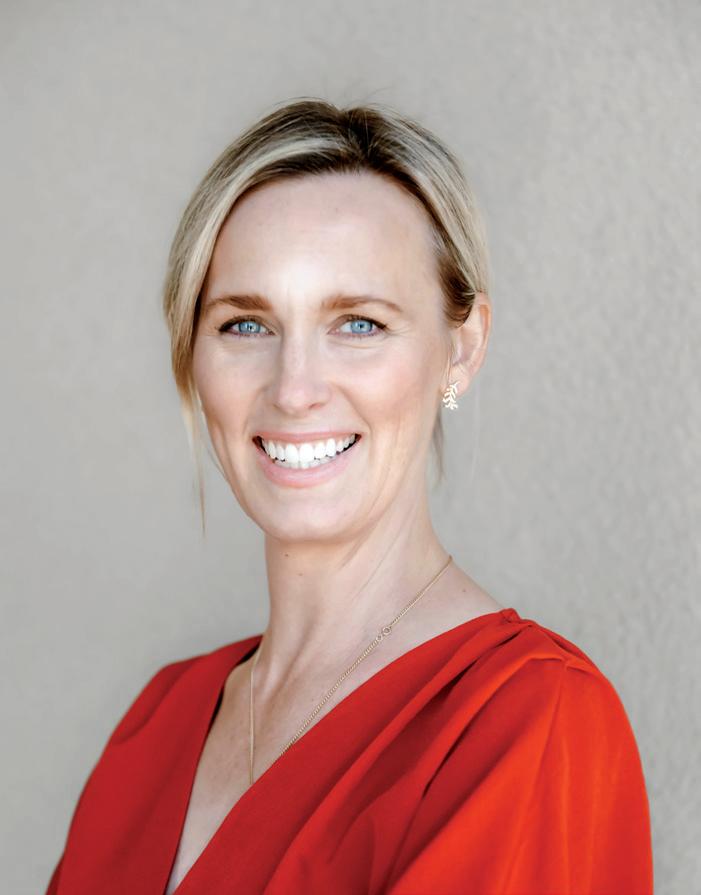
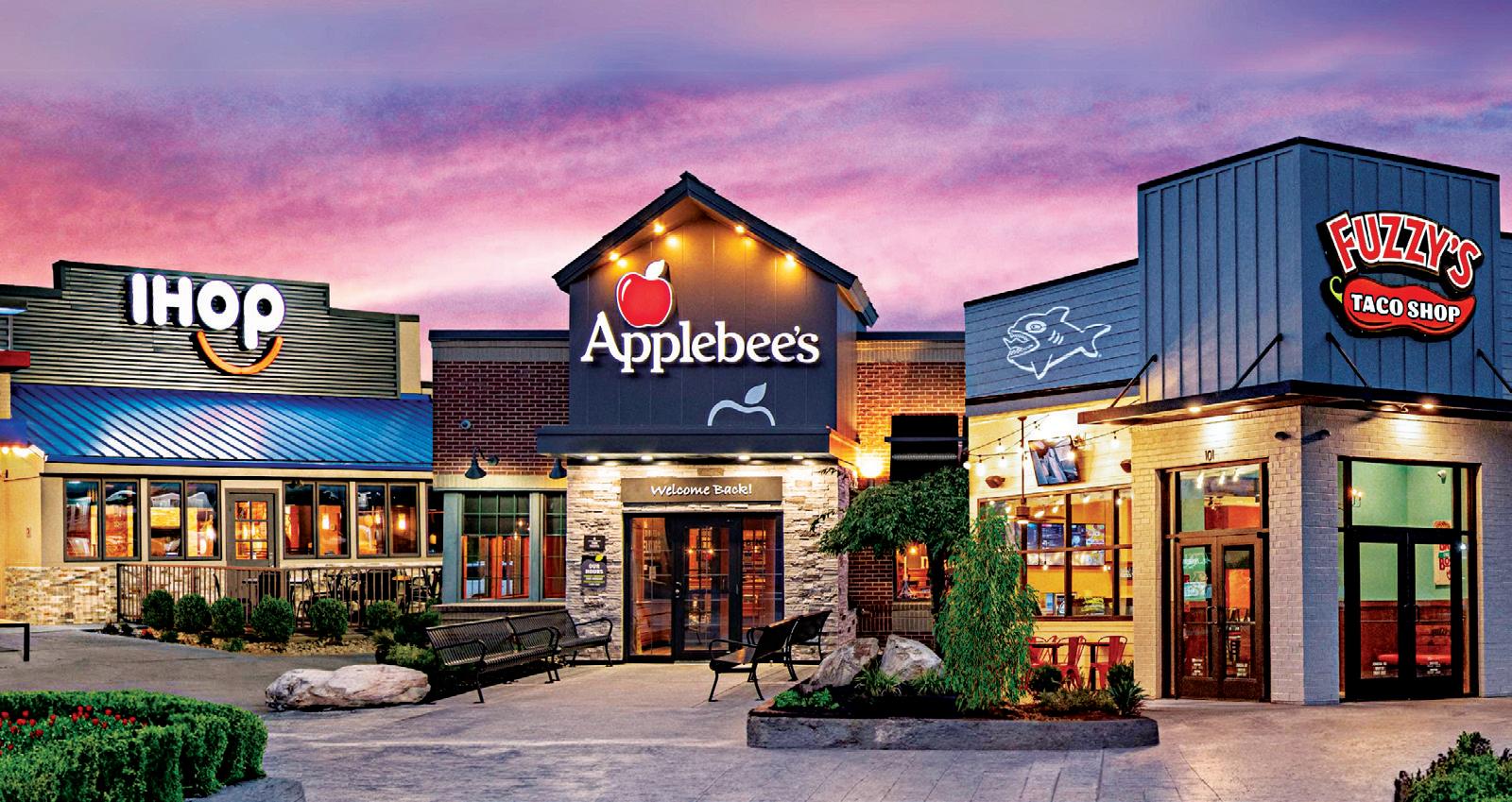

growth of Dine Brands’ partnership with Alex’s Lemonade Stand Foundation, fundraising for pediatric cancer research.
To date, Applebee’s has raised more than $17 million over the past 20 years.
“This is just one of the ways Applebee’s gives back to our communities, and it brings me great pride to see the work our teams do in-restaurant and at our support center each year to help our young neighbors battling this disease,” she says.”
Hariri adds, “Communications leaders wear many hats and have the unique responsibility to promote and protect our restaurant brands. We also shape our company culture through
the stories we help our leaders craft and share. Given our reach and exposure to leaders at all levels, we can influence business decisions and, in my case, how to give back to communities nationwide.”
Throughout her journey in the restaurant industry, Hariri has been a strong advocate for mentorship programs, leadership training, and fostering networking groups for women leaders. “Restaurant brands can help women leaders through mentorship programs, consistent leadership training, addressing and reforming pay gaps, and creating and nurturing networking groups for women,” she says. “Celebrating wom -
en's achievements is also key. These efforts can help women thrive in leadership roles but also build a supportive and inclusive culture where everyone feels valued and motivated to do their best.”
Looking ahead, Hariri hopes to see more women stepping into leadership positions across the industry, particularly in restaurant ownership and franchising. “I'm inspired by the progress we've made with more women earning and receiving a seat at the table,” she says. “Inclusion and diversity of thought are crucial for improving our teams and businesses. I'd love to see more progress in making restaurant franchising accessible to women owners through targeted funding, leadership training, and mentorship opportunities.”
By championing inclusion and leadership development in the industry, Hariri is fostering a future where more women are empowered to grow, lead, and make a lasting impact.
Christine Lorusso
VICE PRESIDENT OF DIGITAL MARKETING Firebirds Wood Fired Grill

For Christine Lorusso, effective leadership begins with clear communication. It’s the foundation of her approach at Charlotte, North Carolina-based Firebirds Wood Fired Grill—one that fosters collaboration, minimizes errors, and keeps teams aligned on critical deadlines. “By leading with open communication, I have also helped to create a positive work environment for our team by establishing trust which allows for the free exchange of ideas, resulting in innovation and problem-solving,” she says.
Lorusso believes that when organizations prioritize open dialogue, they create spaces where all employees—particularly women—can succeed.
“Women tend to lead with
a more collaborative style, resulting in higher levels of productivity which also benefits the brand,” she says. “Restaurant brands that embrace collaboration and understand the importance of open communication will result in an environment where women leaders thrive.”
Yet, Lorusso acknowledges that the path to leadership in hospitality can be uniquely challenging for women. “Women entering leadership roles in any industry can be a challenge, but I think it is especially hard for women in the hospitality industry due to the nature of the business. Women might feel pressured to choose between having a family or a successful career, but that should no longer be the case,” she says.
She continues, “We need to continue to embrace flexibility and promote work-life balance.
Women are masters at multi-tasking, we can ‘do it all’ and brands that recognize and embrace this will continue to see increased productivity, profitability and retention.”
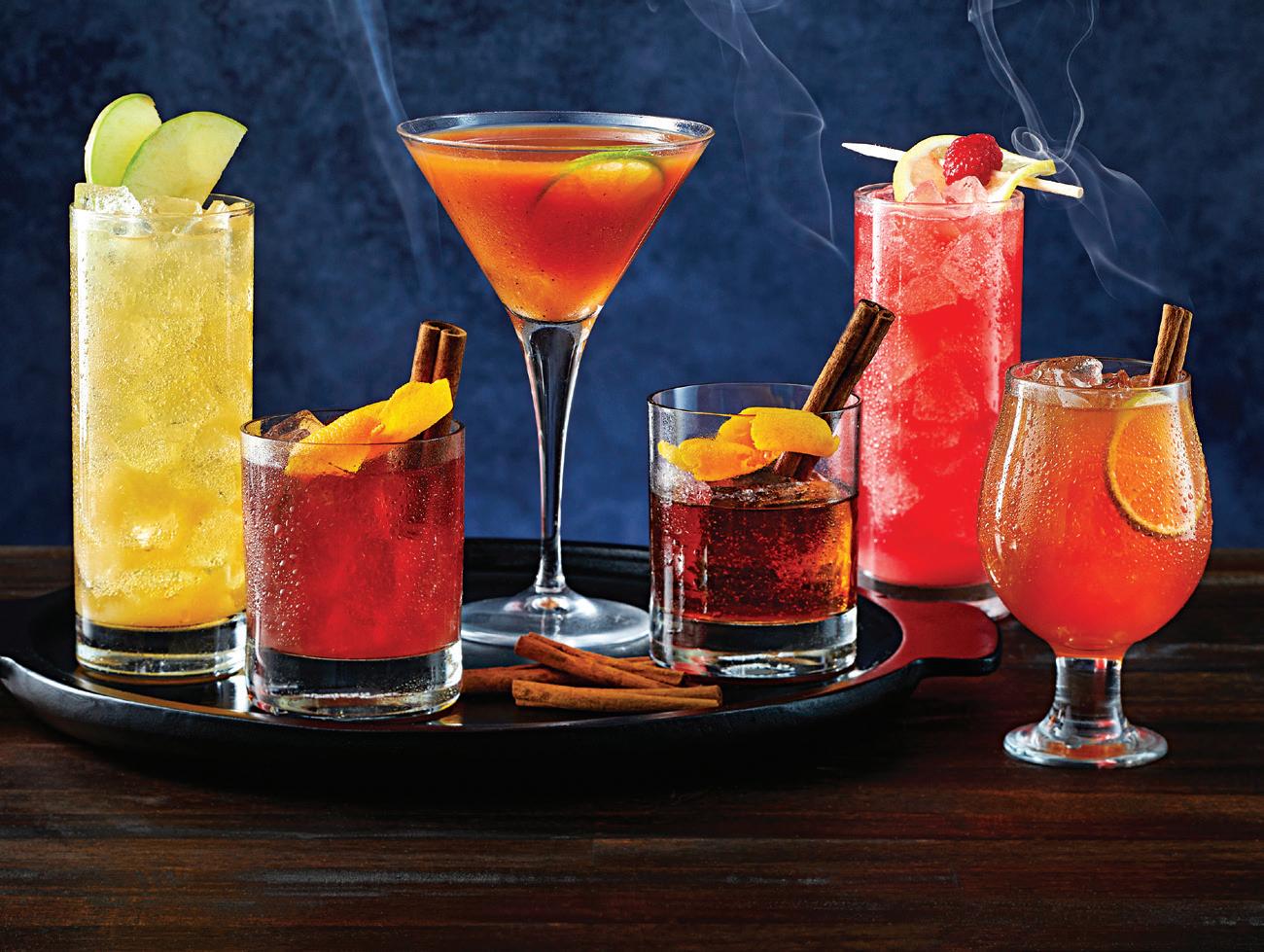
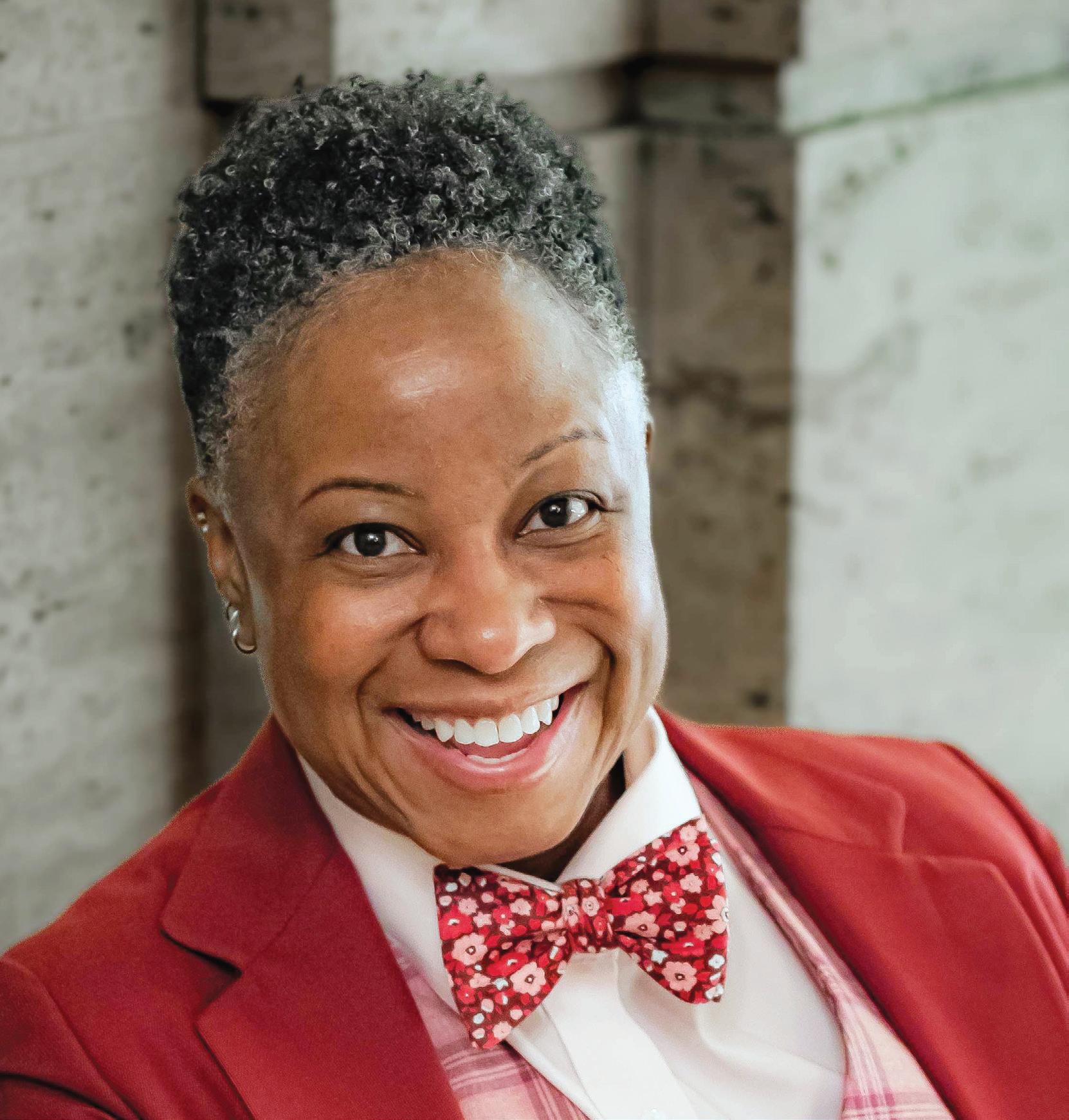
Felicia White
VICE PRESIDENT OF LEARNING AND LEADERSHIP DEVELOPMENT Ascent Hospitality
While on a cruise celebrating her best friend’s birthday, Felicia White heard someone call her name. Scanning the crowd, she spotted a former employee she hadn’t seen in 17 years. He introduced her to his family and thanked her for being the best boss he’d ever had.
“I believe that at times the truest and longest lasting impact we leave is the one left on individuals that is often not said,” White says.
“I was humbled to know he remembered me after 17 years, and even more to know the type of impact I had in his life and career.”
For White, being intentional about employee development is crucial, particularly in creating pathways to success for women. She urges brand leaders to invest in the growth of their

female leaders by providing increased visibility and opportunities to strengthen their skills— while also recognizing the unique responsibilities many women juggle, such as caregiving and motherhood.
“It is important that brand leaders intentionally create opportunities for women leaders to perform in roles that allow increased visibility and chances to further build their skills, while honoring the key qualities women leaders bring and respect
the responsibilities they may have such as caregiver or mother,” she says.
Looking ahead, White hopes to see more women stepping into the highest levels of leadership within the industry, supported by meaningful benefits
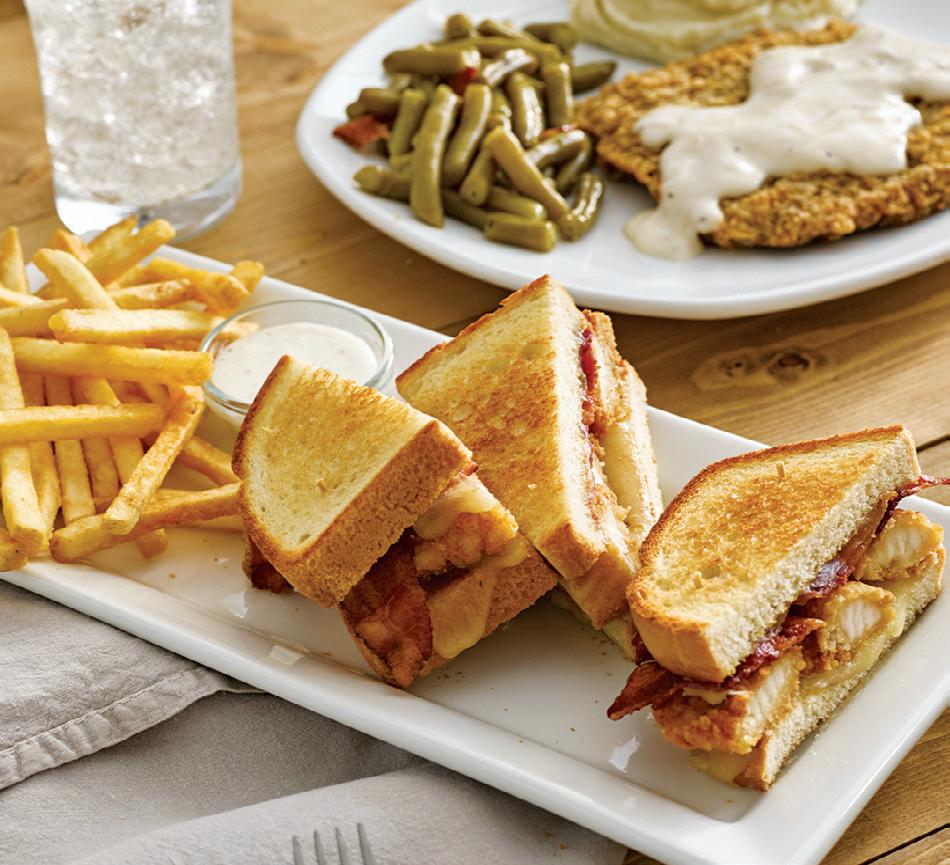

creative leadership has allowed Flesher Sonnier to build The Ginger Brands into the innovative company it is today. She credits much of her success to her willingness to step back and let others take the reins where needed.

that address their unique needs. “I would like to see even more women in CEO positions and organizations offer benefits in support of women’s health such as covering costs of fertility treatments and caregiver benefits,” she says.
By fostering an environment that empowers women to lead—while also providing the necessary support structures to help them balance career growth and personal responsibilities—White believes hospitality brands can create a stronger, more inclusive future for the next generation of leaders.
Ginger Flesher Sonnier
Ginger Flesher Sonnier has never been afraid to reinvent the rules of hospitality. From pioneering the escape room trend in Washington, D.C., to launching the first urban axe-throwing lodge in New York City, she has built an empire rooted in experiential entertainment. Her latest venture, THRōW Social, is a vibrant, high-energy concept that blends backyardstyle games, live music, cabanas, and chef-driven cocktails—further solidifying her reputation as a leader in the competitive social dining scene.
Flesher Sonnier’s leadership has always been defined by her ability to adapt, delegate, and empower her team. “During the expansion of my first brand, Escape Room Live, in 2015, I faced the challenge of overwhelming demand against the backdrop of limited experience in scaling such an operation,” she says.
Recognizing the risk of burnout among her staff, she made a pivotal deci-
sion: “I adapted by hiring a strong support staff including a director of operations and a marketing manager. This strategic move not only alleviated the pressure but also empowered my team, transforming the business from a single location to a multi-city, multi-brand entertainment powerhouse.”
That ability to trust her team while focusing on
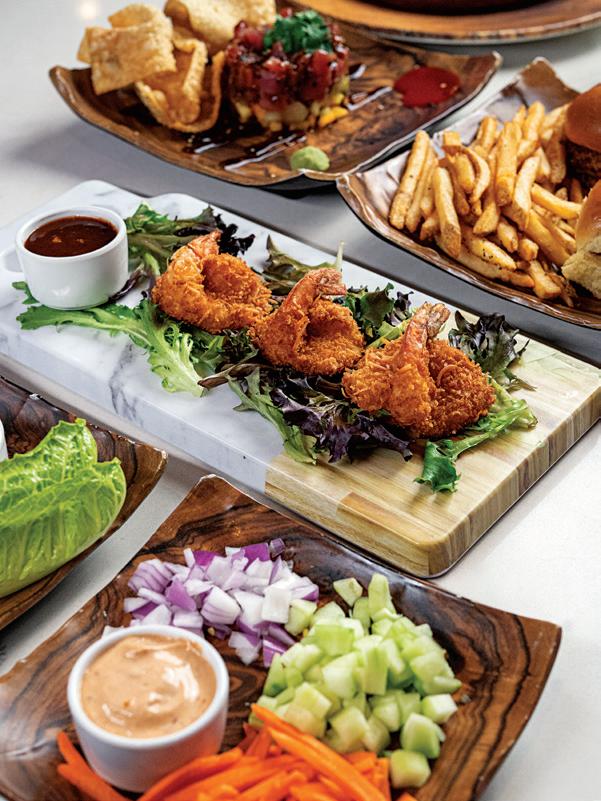
“My decision to step back, delegate, and trust was extremely difficult for me, but it allowed me to focus on creative leadership, allowing my team to flourish,” she says. “It demonstrated how lateral thinking and commitment to support staff directly contributes to an organization's success and team morale.”
Beyond her own ventures, Flesher Sonnier is passionate about fostering an industry where women can thrive. “To cultivate environments where women leaders can thrive, restaurant brands need to start with equality in opportunity,” she says. “This means ensuring that women have access to the same professional development and leadership training as their male counterparts. We must also focus on mentorship and sponsorship, where experienced leaders, regardless of gender, actively support and guide women into leadership roles.”

The award-winning comfort food at Coloradobased The Post Chicken and Beer was born from a deep love for fried chicken and hospitality.
BORN AND RAISED in the college town of Boulder, Colorado, chef and restauranteur Dave Query has cooked all over the world, but decided no French bistros could beat the cozy vibes of his hometown.
At 14 years old, Query began working at a hot dog eatery in downtown Boulder. He kept cooking through his adolescence and ended up at the Culinary Institute of America (cia), in New York. Query and his girlfriend at the time, whom he had met at CIA, “traveled all over the country, went to France for a year, lived in San Francisco, New Orleans, and Chicago,” he says, “just cooking everywhere we went.”
HQ: Boulder, CO
FOUNDED: 2013
CUISINE: American Comfort Units: 5
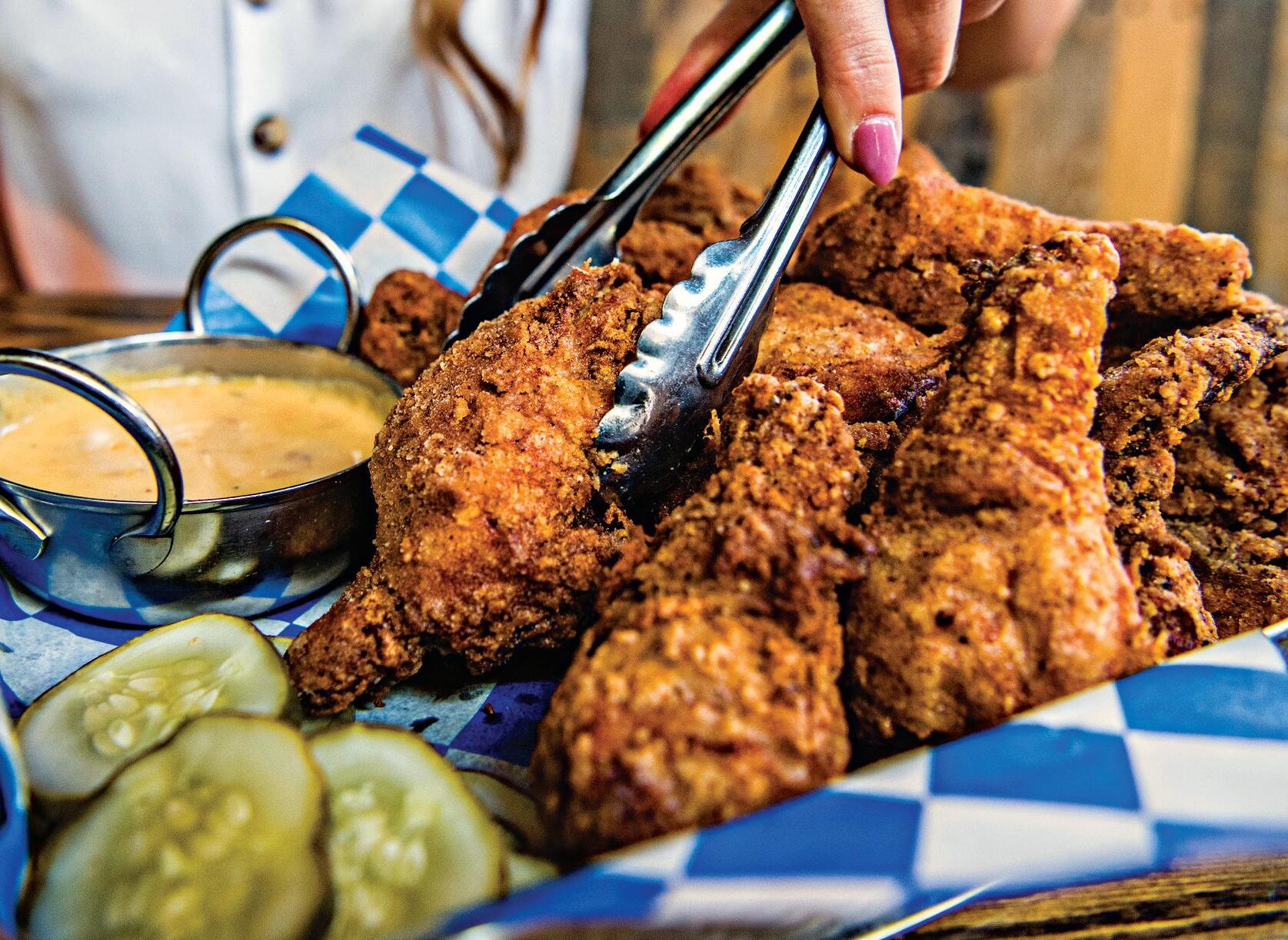
FOUNDERS: Dave and Dana Query; Brett Smith (Big Red F Restaurant Group)
After exploring many varieties of American cuisine, Query moved back home to Boulder and began to distinguish himself in the town’s restaurant scene. He opened his first restaurant in 1989, the Lickskillet Cafe, then opened Q’s Restaurant within the famed Hotel Boulderado (the Q stands for Query), before transitioning to working as executive chef at a fine-dining establishment in the area.
Cementing himself within Colorado’s culinary lore took a few years. In 1994, he and his wife Dana founded Big Red F Restaurant Group, which owns
and operates 14 locations in Colorado, spread between its six full-service brands. Five of those locations house The Post Chicken and Beer, a bustling concept that is most well-known for its expert fried chicken recipe, alongside a multitude of home-style comfort foods.
In 2014, Query decided to do a double take of the group’s beer list. “I was just rolling through beer [from different brands],” he says, “and I thought, ‘Man, we should make our own beer.’” However, Query did not want to open a “predictable” brew pub or wing and burger joint. He also wanted to avoid the already-saturated taco and pizza markets.
“One of my business partners, Scott Beck, owned Boston Market,” Query
recalls, “so I started talking to him about the potential of where he thought chicken was going … 10 years ago, no one was doing fried chicken.”
Before the current era of Dave’s Hot Chicken and Raising Cane’s, Query says that one could only find good fried chicken in the American South. “I had not heard of a brew pub focusing on fried chicken, so it was hot chicken and cold beer. We thought that sounded good, so we did it.”
The Post Chicken and Beer was created in nearby Lafayette, Colorado, with an attached brewery. Assisted by Bryan Selders of Dogfish Head Craft Brewery, the duo won silver at the Great American Brew Fest in their first year of beer creation. Now, with Head Brewer Nick Tede -

schi, The Post boasts gold from GABF, as well as other awards from the International Beer Festival, Colorado Beer Guild, and the World Beer Cup. The Post was also featured by Guy Fieri on an episode of Food Network’s “Diners DriveIns, & Dives.” As The Post has proven its superior quality of beer throughout the last decade, fun names are a cherry on top—from the “Mentally I’m Here Belgian Dark Strong Ale” and “Sweater Gang Smoked Lager” to the “Power of Perception Imperial Stout.”
In the brand’s beginnings, Query says, “Our tagline was ‘everyday beers for people who drink beer every day.’ So we didn’t go for these big, geeky, IPAs, and, at first, we didn’t even do an IPA. All of our beers were sort of low-alcohol before that was a new trend, so that they were real light and easy drinking, but also food-friendly.”
Query’s smart move of making beers that wouldn’t fill the customers up before their meals came was a great assist as the brand came to perfect its fried chicken recipe, which is accidentally but proudly celiac-friendly. Query says that he and his team were “going all around the country and trying literally hundreds of breadings to get our fried chicken right. When we landed on the one that we [decided on], it turned out
to be gluten-free, so that was a little bit of a torch that we have carried strong from day one.”
After Query came out victorious from what he refers to as a “lifetime search to find the perfect fried chicken”, he began to curate the rest of the menu.
“We have a great salmon entree, we’ve got meatloaf, we’ve got pork chops,” he says. “We’ve got all kinds of different things that we’re experimenting with, because, at the end of the day, you’re not going to eat fried chicken twice a week for a long time.”
The Post’s menu also features chicken pot pie, deviled eggs, and chocolate whoopie pies, odes to the Southern comfort food that the Querys grew up on. Recently, The Post has begun to lean more into the local ingredients of Colorado, evident in menu items like the hatch chile mac and cheese and Colorado pinto bean dip.
Two years after its initial Lafayette location, The Post opened a second unit in Longmont, followed a year later by locations in South Denver and Boulder, the latter of which they are now based. While the brand’s growth was slowed by COVID-19, The Post decided to switch gears with a split-second move to carry out once the pandemic hit. The Governor of Colorado had passed a law that
allowed for the sale of liquor by restaurants, which permitted the continuation of craft beer and chicken pairings but in a takeout format.
The team recovered quickly once indoor dining was reinstated. The Post opened another restaurant in Estes Park in 2021 on Fourth of July weekend on the grounds of the Stanley Hotel, which was the fifth location to open.
The aura of the restaurants’ interiors also helps to remind the guests of the brand’s Colorado heritage. “The ambiance is kind of high mountain cabin,” says Query. “We’ve taken old aspen trees and made lights out of them. There’s a lot of reclaimed woods from the fires that we’ve had here that have been turned into tables and used for bar materials.” Even The Post’s font decisions help to elevate the guest experience, says Query.
In The Post’s home base of Boulder, the brand stays up to date with the students of the University of Colorado, especially in the football realm. Referring to Deion Sanders, CU football’s new head coach and two-time Superbowl winner, Query says, “The ‘Coach Prime’ effect was indescribable in what that did for Boulder. We hosted the Coaches’ Show [in 2023] at The Post.”
The Post has something to offer for non-college student diners, as well. Last summer, Big Red F had a biscuit war, wherein the chef from each Post restaurant created a biscuit sandwich that guests could try and vote for the winner.
In the upcoming year, expect more fun and engaging events from The Post, including two launch parties for new beer releases, seasonal menu changes, and tailgates in the restaurants’ parking lots. The Post Boulder is also next door to another Big Red F project, the Velvet Elk Lounge, which doubles as a bar and live music venue. Two of the other locations have planned live music schedules on outdoor patios, as well.
At The Post, the effort and passion of restaurateurs Dave and Dana Query can be felt within the atmosphere of the restaurants and the cuisine, but it shines through in the concept’s award-winning fried chicken and beer offerings.
BY SATYNE DONER
Melissa Fry is leading the iconic brand into the future through innovation and inclusivity.
sat in her car outside her local Hooters, summoning the courage to step inside for an interview. A self-proclaimed tomboy with little experience in hair or makeup, she felt unprepared but pushed herself to take the leap anyway.
She quickly realized that being a Hooters Girl was more than just a job— it was the foundation of the brand. Surrounded by strong, empowering women from diverse backgrounds, each with unique skills and strengths, she gained confidence both personally and professionally, thriving in a culture of collaboration and inclusivity.
“I remember walking in as a young woman trying to find myself, figuring out where my confidence was, where my strengths lay, and what the next step in my career path would be,” Fry says. “I’ve met some of my best friends, lifelong mentors, and amazing leaders in this organization. In this family, we all bleed orange. That was clear right away.”
As Fry advanced through the ranks— gaining experience in operations, training, restaurant openings both domestically and internationally, and collaborating with franchisees—marketing was always in the back of her mind. She embraced every cross-functional opportunity as a chance to gain a unique perspective on the brand’s evolution, continually putting herself out
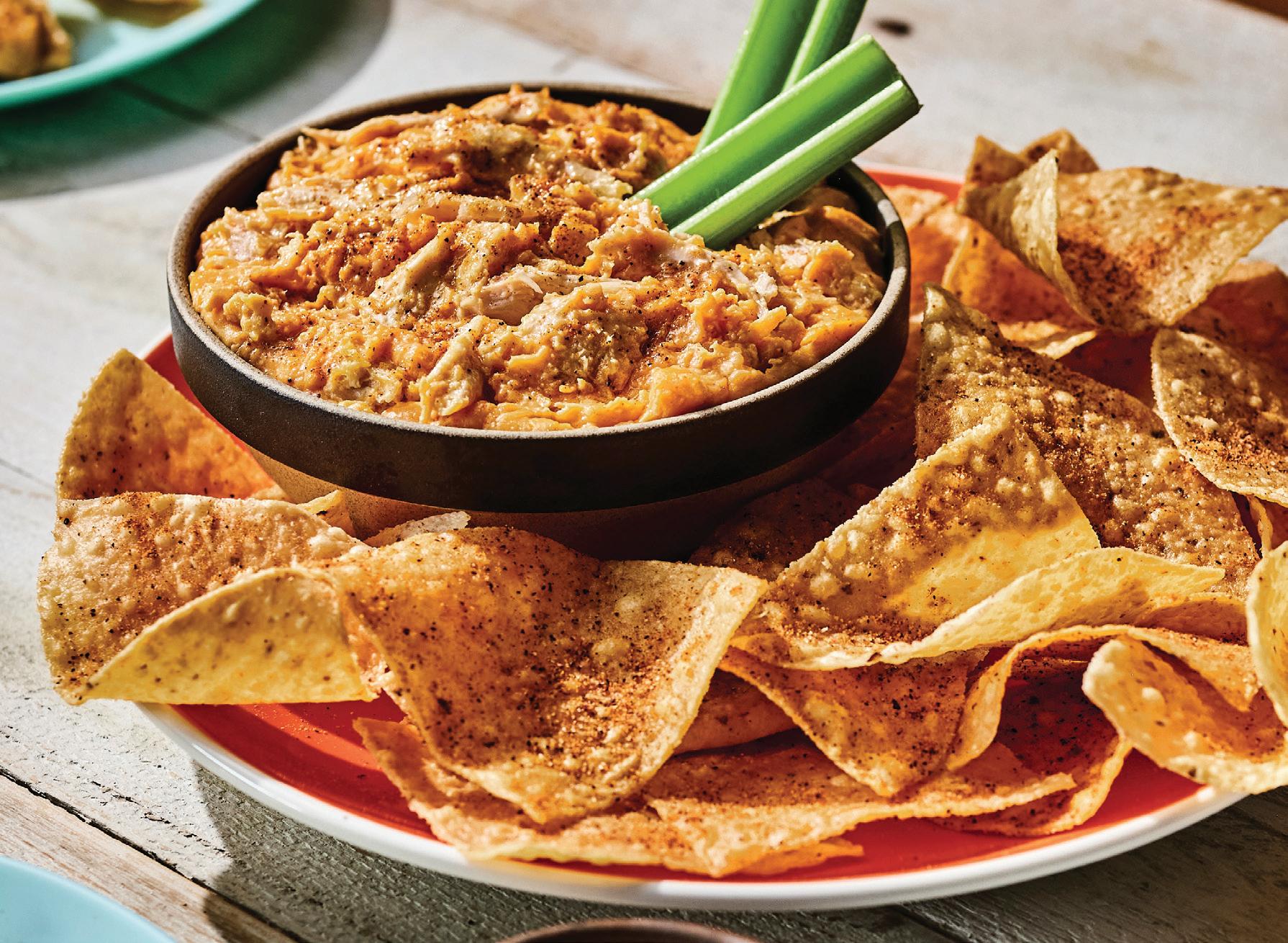
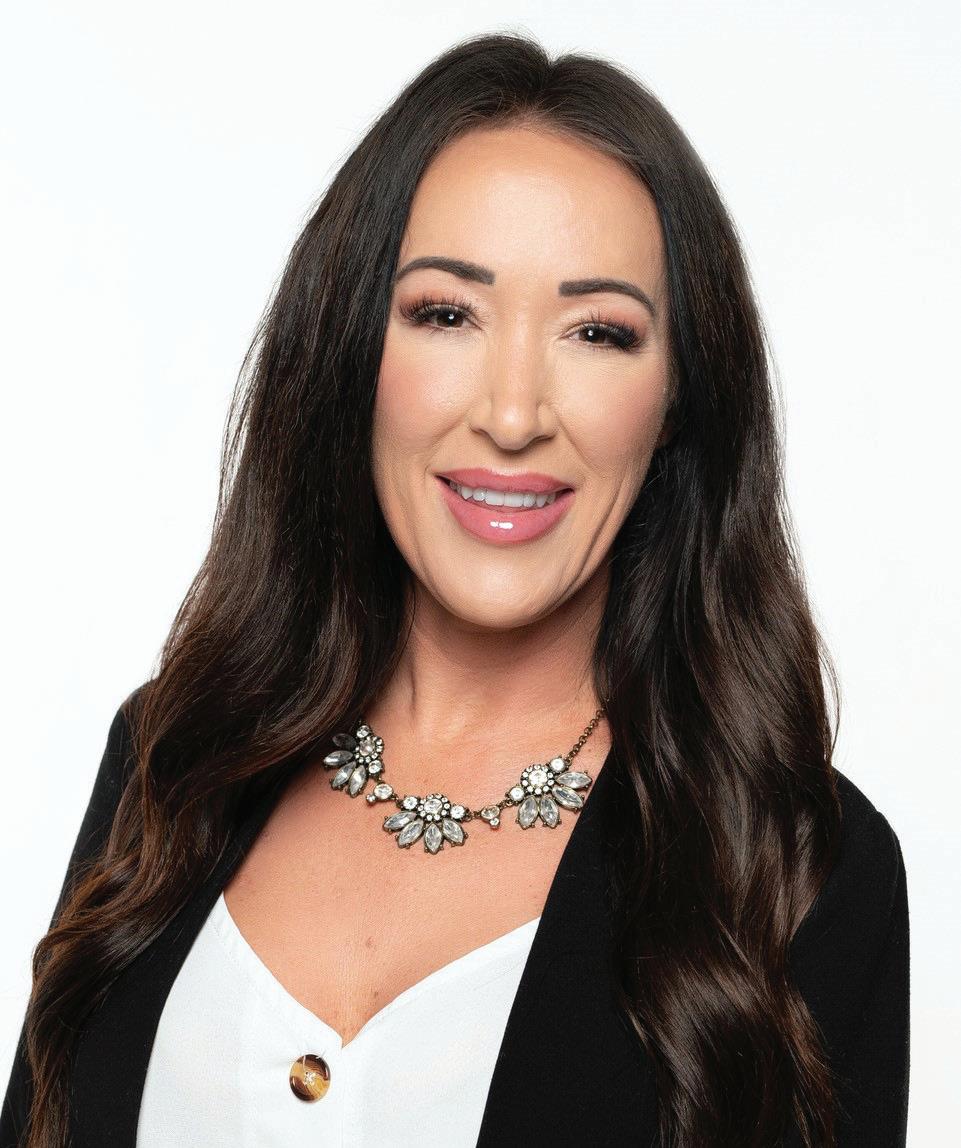
there until the moment felt right.
In 2009, Fry took on the role of director and choreographer for the Miss Hooters International and Miss West Coast Hooters pageants, a title she still holds today. In October 2023, she was promoted to senior director of marketing for HOA Brands, Hooters’ parent company. Across all of her positions, she has worked closely with the Hooters brand for 25 years and counting. For nearly three decades, Hooters
pageants have been deeply ingrained in the brand’s DNA and the broader pop culture landscape. Throughout her tenure, Fry has played a pivotal role in repositioning the legacy brand to connect with today’s employees and guests by empowering both current and future Hooters Girls.
A key part of this effort is integrating the company’s traditional SERVE values—Show You Care, Elevate the Spirit, Respect Everyone, Value Feedback, and Exceed Expectations—with modern standards of inclusion and equality. Fry emphasizes the importance of honoring the iconic Hooters Girl image in a way that resonates with today’s society.
“The pageant highlights the strength and individuality of these young women

and how they embody what it truly means to be a Hooters Girl,” Fry says. “They are our most strategic brand asset. By celebrating each contestant’s uniqueness and demonstrating that women can be both strong and beautiful in their own way, we’ve evolved the event to better reflect the inclusive values of today’s world.”
Revamping Hooters’ social media strategy has also been a key part of the brand’s evolution—both inside the restaurant and during events like pageants and annual calendar shoots. Fry is passionate about amplifying the voices of Hooters Girls, empowering them to build their personal brands on social media and connect with their local communities. They also play a role on a national level, taking over the corporate social media pages and supporting the company’s many charitable initiatives, such as the Give a Hoot campaign, which has raised $10 million since its launch over a decade ago.
“Leaning into social media allows us to engage with a younger, more diverse audience in an authentic way. We’re continuing to innovate while keeping the iconic Hooters experience alive, a tradition we’ve known for 42 years,” Fry says. “Ultimately, we want our team to feel elevated, connected to the brand, and confident in speaking about what’s impor -
Through her connection-first outlook on marketing and deep passion for the Hooters Girl experience, she is reintroducing the brand while reinforcing its commitment to community initiatives and a culture that seeks to elevate, educate, and empower.
“I’m honored to have the opportunity to reshape the future of Hooters, especially as we modernize our approach while maintaining our core values and most strategic brand assets—our Hooters Girls,” Fry says. “I have been with the

tant to them.”
A localized marketing approach has also helped Hooters create meaningful touchpoints in communities nationwide. Fry leads a team of local marketing managers who coordinate calendar tours, raise money for charity campaigns, and engage in general outreach. She empowers her team to support causes that matter to them—one of her senior managers, for example, organizes annual walks and fundraisers in partnership with the Down Syndrome Association.
“Being able to engage and resonate with specific audiences in local communities helps align the brand’s mission with community needs,” Fry says. “It also helps people see Hooters in a different light, bringing awareness to the fact that we actively support these local initiatives. It’s a huge part of our success, and we’re committed to making a positive impact in every community we serve.”
Fry’s leadership has helped revitalize one of the world’s most recognizable franchises for a new generation.
brand for 25 years, and we are so resilient. This is a chance for me to continue challenging myself and growing in my career while also influencing the brand’s future.”
Her advice for women in restaurant leadership? Be authentic, be persistent, stay open to networking, and never underestimate your own power—even in moments of disappointment or uncertainty. It’s all part of the journey.
“In the restaurant industry, building strong relationships is crucial because you never know what doors will open,” Fry says. “There have been plenty of times I put myself out there and wasn’t fully ready, but I learned from the experience. Instead of feeling defeated, look for opportunities to grow and never be afraid to ask for help. You miss 100 percent of the chances you don’t take.”
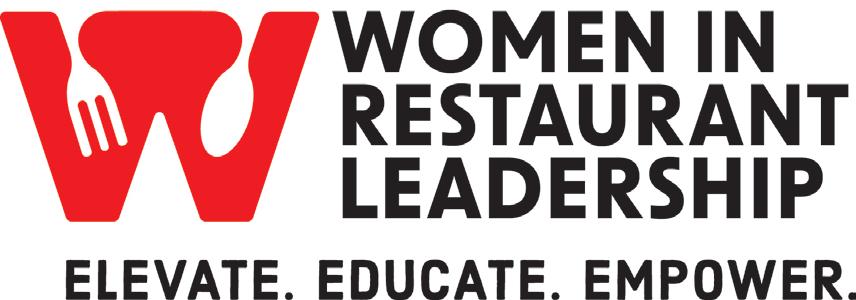
Ecolab .
800-352-5326
ecolab.com/LaborSavers
Ghirardelli
888-402-6262
ghirardelli.com/professional
Idaho Potato Commission
208-334-2350
idahopotato.com
McCain
800-938-7799
SureCrisp.com
800-322-SPICE
McCormicksForChefs.com/Crafted-Without-Compromise
Perdue
perduefoodservice.com
Progressive Commercial
888-806-9598
ProgressiveCommercial.com
Pryze
pryzeapp.com
VITO Fryfilter
887-859-0398
vitofryfilter.com
Advertising Inquiries
Eugene Drezner, VP, BUSINESS DEVELOPMENT edrezner@wtwhmedia.com | (919) 945-0705
Amber Dobsovic, NATIONAL SALES DIRECTOR adobsovic@wtwhmedia.com | (757) 637-8673
Edward Richards, NATIONAL SALES DIRECTOR erichards@wtwhmedia.com | (216) 956-6636
Mike Weinreich, NATIONAL SALES MANAGER mweinreich@wtwhmedia.com | (561) 398-2686
Tom Boyles, NATIONAL SALES MANAGER tboyles@wtwhmedia.com | (662) 607-5249
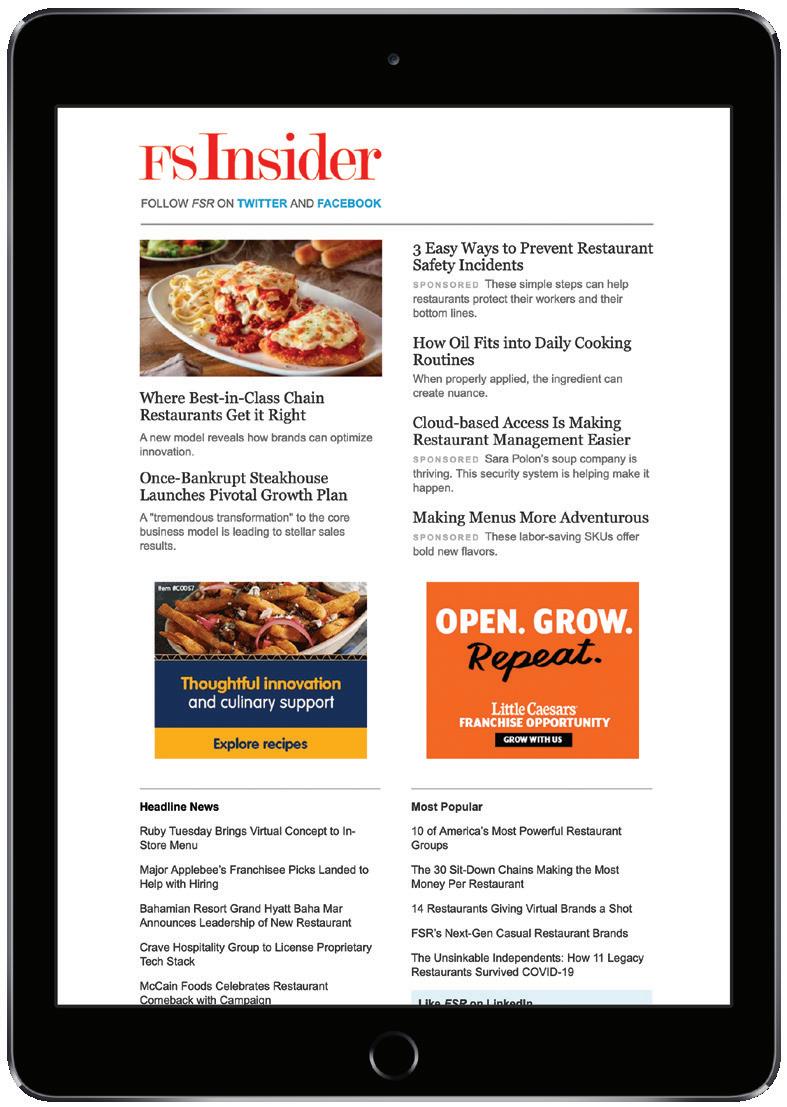
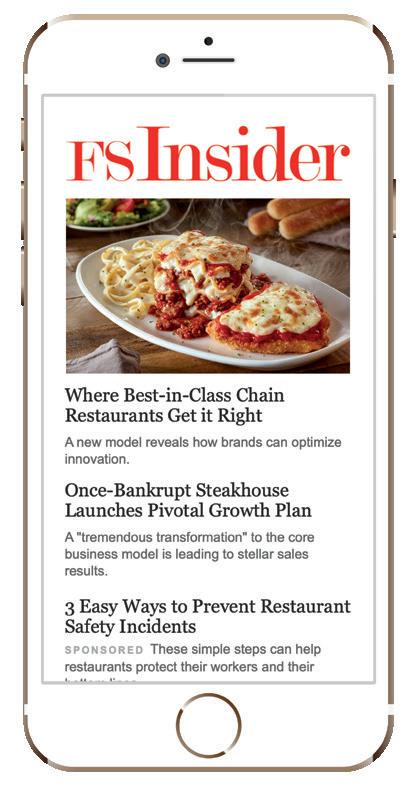

MELISSA WALSH
ROLE: Brand Insights
Manager
BRAND: First Watch
LOCATIONS: 500+
FOUNDED: 1983
HQ: Bradenton, FL
FSR sat down with Melissa Walsh to learn how she’s leading First Watch into the future when it comes to data. For example, with the help of Walsh, the breakfast and brunch brand is using custom data tracking to sharpen its consumer insights strategy. Since joining in 2021, Walsh has spearheaded the launch of a proprietary tracker to decode customer preferences and emerging trends—like the growing demand for snacks and shareables. She also shares insights on overcoming data challenges and connecting more effectively with consumers at the brand’s 500-plus locations.
BY CALLIE EVERGREEN
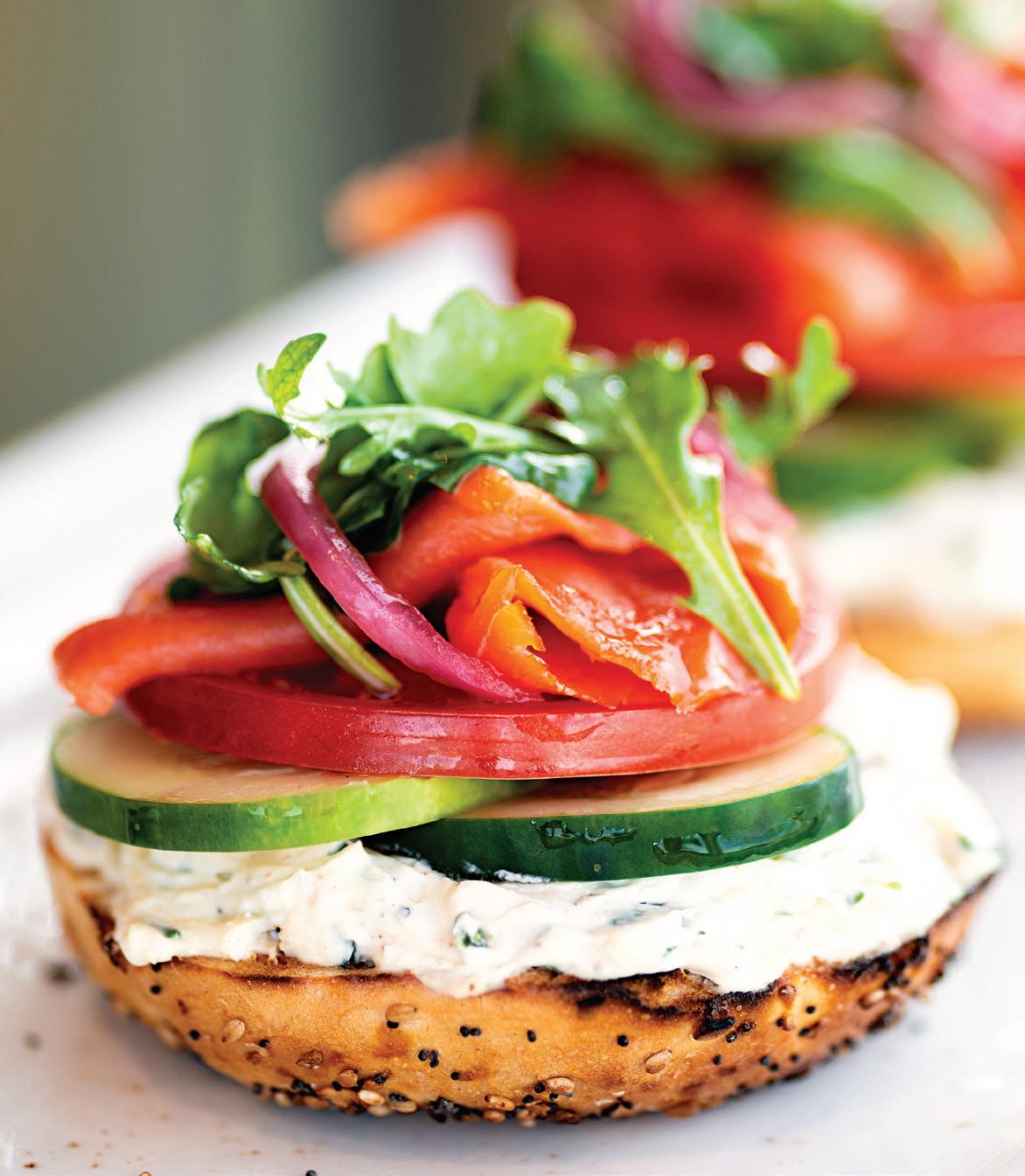
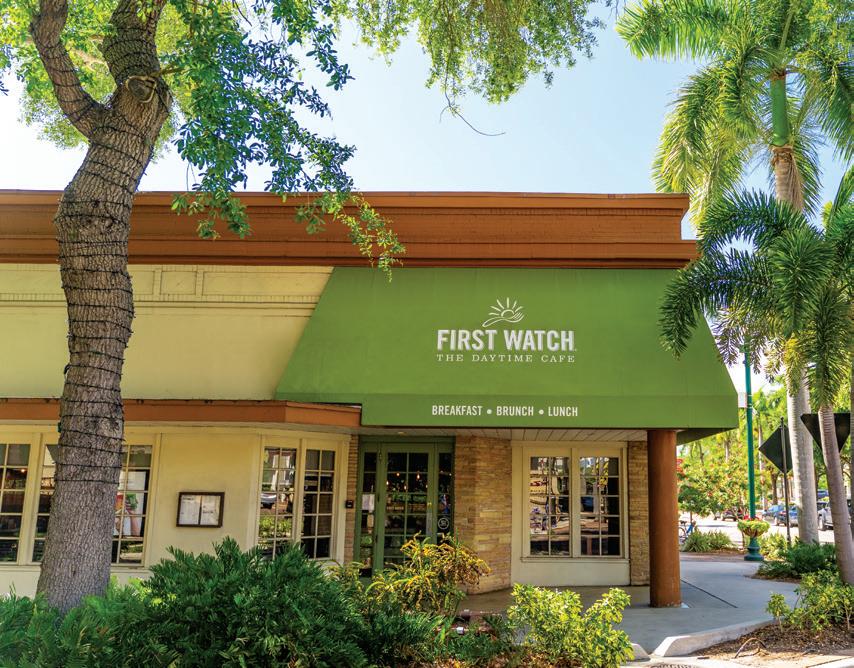
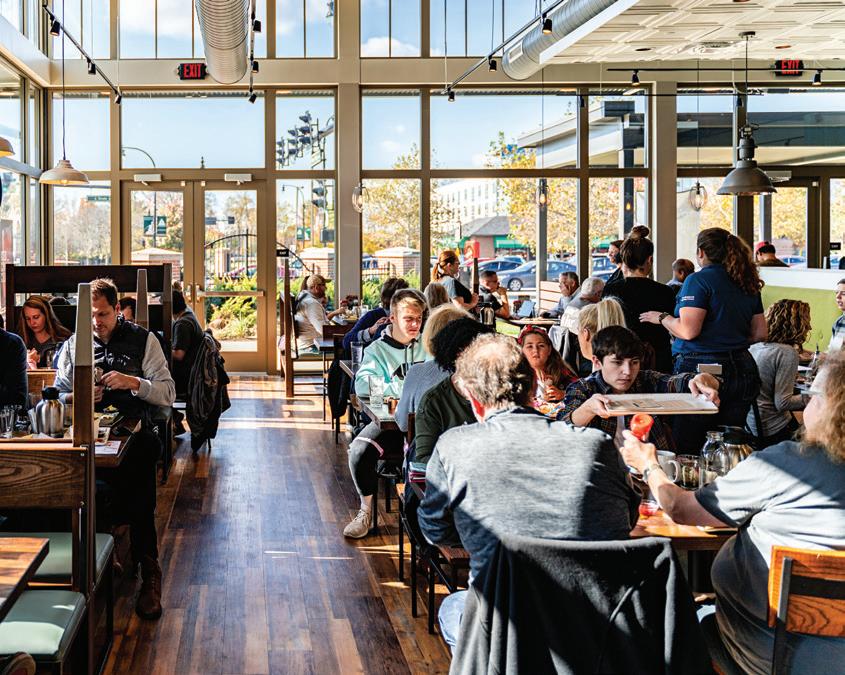
What is a current priority in your role?
Since coming on board in 2021, trying to find a syndicated research tool that was helpful and actionable for us has been very difficult. We recently (in June 2024) launched our own custom tracker, and we set it up to be the most valuable for the efforts and attributes we’re wanting to monitor for a longer-term play.
Have you seen any impacts from that initiative yet?
I think that has really helped our team focus on where we should be prioritizing. We now have access to all of that data, and we’re just scratching the surface in how we leverage it to really help us understand our customer and our category more.
What are some broader industry trends you’ve noticed in your research?
One trend we’re starting to follow is snacks— a.m. snacks, p.m. snacks. What I’m trying to prove out is, younger customers in particular almost have an obligation to treat them-
selves. I think it’s been amplified post-COVID. We’ve not really tapped into that occasion yet. For us, I think we are trying to get into the shareables and what that looks like, so our Stay Golden Cinnamon Roll … we’re trying to tap into what that looks like. We’ve tested donuts in the past on our seasonal menu, we’ve done cornbread. Being a sit-down, it’s a very different ball game than your typical QSRs and fast casuals of the world.
What challenges are top of mind?
The challenge I think everyone faces is being able to connect all the right data pieces together; I still think that is an issue many brands face. We are in the process of making them all talk together so we can action on it. This is going to sound cliche, but having the right message at the right time in the right channel, and being able to measure that whole journey at each touch point is going to be a game changer. I think for me, the focus and goals are really to track each part of the journey and understand how we can continue to just connect with consumers in the way that resonates with them.
